Lighthouse careers
- [email protected]
- +33 451 088 780
- Calculate your salary


Yacht engineer salary and job description
According to an article published in 2021 from MTU, engineering jobs are once again one of the highest paying careers on the market, and for great reason!
Engineers endure years of intense studying to achieve their degree, making them among the most responsible and hard-working individuals in the job market. One of the many benefits of an engineering career is that you are not confined to a cubical setting. Have you ever considered working on a yacht?
But what does a yacht engineer do, and how much does a yacht engineer make?
Guests board yachts to take them to exciting destinations and see corners of the world that others only dream of. Read on to learn why yacht engineers are one of the most sought after positions on the market today!
You can also check out this link to skip ahead and view some of the available yacht engineering positions available in your area!
Yacht Engineer positions
Before determining how much a yacht engineer makes, it is necessary to break down and understand the qualifications and responsibilities of the different types of engineers.
Also, it is crucial to remember that the pay of each yacht engineer position will vary based on several factors, including vessel and engine size, itinerary other requirements linked to the safe manning of the yacht.
We aren’t really used to this, right? Many career fields on land have general pay scales that you can use to compare positions, say, in different cities or with competing companies.
At sea, the numerous factors involved make it difficult to pinpoint an exact yacht engineer salary that will apply to every position. However, this article will provide you with the latest figures and research to give you an accurate idea of what to expect.
This way, you can plug in your own numbers and have a reasonably precise idea of how much dough you’ll be reeling in per month.
Without further ado, let’s jump right into the most common yacht engineering positions you would find sized on any vessel.
Chief Engineer
If the captain of a yacht is considered the brain, think of the Chief Engineer as the heart.
Much like our brains, Captains ensure that every aspect of the operation is working seamlessly and coherently to ensure smooth sailing.
Similar to how brains need blood and oxygen to ensure smooth running, Captains need their Chief Engineer to help oversee mechanical operations and keep the vessel running in tip-top shape.
The Chief Engineer reports directly to the Captain and, depending on the yacht size may also lead his team of engineers below. Regardless of the size, it is the Chief Engineer’s responsibility to ensure the vessel is up to industry standards in regards to all maritime regulations.
One critical aspect of the Chief Engineer’s job is to ensure that the vessel will pass all of the necessary flag and port inspections. To learn more about what to expect, click here and view the Ultimate Guide to PSC Inspections on Ships!
A failing grade may result in the detainment of the vessel, which is probably one of the worst things that could happen, especially with guests on board who are dreaming of their next destination. Engineers must be able to see problems before they arise. Proactivity is key!
The Chief Engineer aboard a yacht helps to keep things running efficiently, and on smaller vessels, their responsibilities will also include those of the Second Engineer.
Second Engineer
As their name suggests, Second Engineers are typically second in command. They report directly to the Chief Engineer. In certain instances, it may be necessary for them to step in as acting or temporary Chief Engineer. They must be familiar with and able to adequately perform the same duties.
On larger vessels, the Second Engineer may be the main supervisor for any Junior crew members under them, such as a Third or Fourth Engineer.
The day-to-day requirements of Second Engineers can vary, so this position is full of excitement and new schedules!
Therefore, all Engineers must be flexible. They could spend hours working in the engine room on one day, then spend all day the next helping out with difficult guest situations.
Yacht Engineers spend the majority of their day working to prevent issues before they happen. Active thinkers who can quickly assess difficult situations to find the best solution possible are great candidates for yacht engineering positions.
Both Chief and Second Engineers could be hired for permanent positions, on a rotational contract, or even on a temporary basis to cover for leave or a crossing or yard period for example. But what does that mean for your salary?
How Does a Rotational Contract Affect Pay?
In short, you will be paid less if you are in a rotating position as opposed to being permanently hired in the same role. However, many crew members would argue that the benefits of being on a rotation far outweigh the difference in pay.
It’s no surprise that working on a yacht can provide its fair share of challenges, especially in regards to one’s personal life. Being out at sea decreases your time with family and friends.
Rotational contracts are typically 2:2, or 3:3meaning one month at sea then one month on land (or three months at sea, etc). Increasingly we are seeing 10 weeks on/off rotation so that crew are not always working the same months of each year. This is often the preferred option because it provides you with the best of both worlds: you’re able to have a well-paid job, while also cherishing irreplaceable family time.
Most yachts over 50m now offer full rotations for the chief engineer, and increasing for the second engineer positions. This is good news for the industry, as the engineers can transition entirely behind the scenes. Guests aboard the yacht will have no idea that the new team is in place, and that is crucial to a smooth transition!
This rotation also dramatically decreases the number of crewmembers who burnout from being at sea for so long. In the long run, rotating crews are often beneficial because they lessen the need to go through the hiring process every six to twelve months if permanent crew members decide to head back to land. This can be costly in every sense of the word.
How Much Does a Yacht Engineer Make?
Yacht engineer salary grids.
Above 50m, the Chief Engineer contracts are generally Rotational . The breakdown of their salary per month is below:
On yachts above 50m, crew may be offered Permanent Second Engineer or Rotational Second Engineers contracts. The average monthly salary for yachts from 50-90m for Permanent Second Engineers is as follows:
Finally, the average monthly salary for Rotational Second Engineers on vessels above 60m is as follows:
As you can see, rotational positions can be paid a similar salary to their permanent counterparts, however this will always be dependent on the certificate requirements and specific yacht and itinerary information. To learn more about this unique option, check out this informational article!
Necessary Background Experience
The ideal Yacht Engineer should have experience working on a charter at sea. Similar sized vessels to the open position will probably be preferred and set candidates apart from the competition.
They ought to display high levels of attention to detail and problem solving, as well as being able to plan and maintain an organized and efficient workspace.
Being prepared for any possible scenario is the backbone of a successful yacht engineer. Situations often arise that will need to be handled with poise and efficiency, and the best applicant will have experience keeping a level-head in these tough scenarios.
Again, a history of leading proactively looks great on the job application.
There are various pathways open to become a marine engineer. You can either complete an engineering cadetship through your national Martime School or go down the more specific yachting career path. In this case the MCA in the UK and the USCG in the USA are the better known ones.
Need a Yacht Engineer?
Whether you are inquiring about a position for yourself or hoping to fill a position on your yacht, you may have further questions, for example, just how much does a yacht engineer make?.
Don’t worry, you’re not alone!
Lighthouse Careers provides you with the tools and assistance you need to put together a crew you will be proud of. Take a few moments out of your day to submit an inquiry , and hear back from talented professionals ready to step on board!
We also make it easy to find your dream a position aboard a yacht. Register your application with us so that we can match you to employers and yachts that fit your needs!
When you’re ready, we’re here waiting to help you succeed!
Recent Posts

What Makes A Good Yacht Engineer?

New Year New You – Tips for Keeping a Healthy Lifestyle Onboard

R is for Rotation

5 Essential Qualities of a Successful Yacht Yoga Instructor

The Importance of Menu Planning for yacht chefs

5 Qualities to Look for When Hiring a Yacht Masseuse/Beautician

How to Find the Right Purser a luxury Yacht: Tips for Hiring

Moving up too Quickly……
Our mission.
We strive to be the first-choice recruitment service provider for both clients and candidates alike. Our goal is to make the recruitment process as smooth and seamless as possible

- Browse jobs
- Affiliates/PCCP
- Looking for crew
- Looking for staff
- Mission Statement
- Blog articles
- Baya, Building 7 400 Avenue Roumanille Village d’Entreprises Green Side BP 309 06906 Sophia‑Antipolis
© 2023. Lighthouse-careers
- Yachting for beginners
- Owning a yacht
- Motor Yachts
- Sailing Yacht
- Indian Ocean
- Mediterranean
- Buying or Selling a Yacht
- Yachting Events
- FAQ – Luxury Yacht Charter
- FAQ – Buying a Yacht
- FAQ – Sell your Yacht
- How Much Does It Cost To Charter A Luxury Yacht?
- All our Blog Post & News

Yacht crew positions : Hierarchy, Missions & Salaries explained
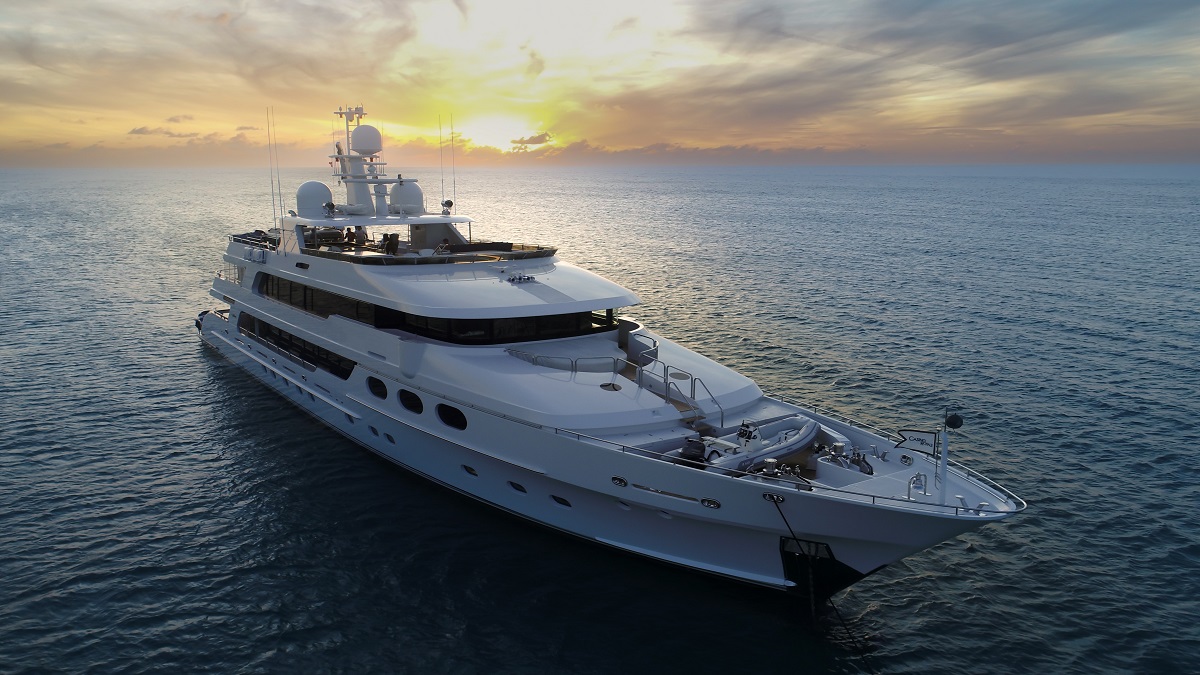
Like any well-run hotel, restaurant, or other luxury service, a crewed yacht needs organized structure and good management. Whether you’re staffing your own luxury vessel or looking for an exciting career working and traveling the world, you need to know how this structure works, and what you can expect to pay or earn and do in the various roles on board.
Every yacht is a little different, and organization may reflect the style of the captain or the demands of the owner. But the same jobs need to be done on almost every boat. Organized with ranks, heads of each division report to the Captain. It’s not a military-style organization, but there are parallels with merchant marine grades and structures.
Smaller yachts need fewer crew, and staff may wear multiple hats that cross more traditional divisions and may combine some jobs with others. Large yachts have more distinct divisions or subdivisions, with more specialization to divide tasks and manage staffing. The core skills are the same, but finding staff with the right blends to do the jobs is key. Crew with broader skills are highly sought after.
As a yacht owner, you shouldn’t have to worry about day-to-day management decisions or organizing all this. That’s why you have a captain, and it’s better to leave staffing decisions entirely up to him or her. But it’s still important to know what it is people you’re hiring do, why they’re there, and how many you need. You don’t want too many crew, or to be short-handed. An understanding of what your yacht needs helps you talk to the captain to keep your yacht running how you want it.
For those looking to break into yacht crew work, consider your skills and strengths, and what jobs appeal to you. You’ll need training before you work, and you can direct your job path through the training you seek. Your goal is a suitable position on a well-run yacht, so make yourself the most attractive candidate possible.
Yacht Work Life
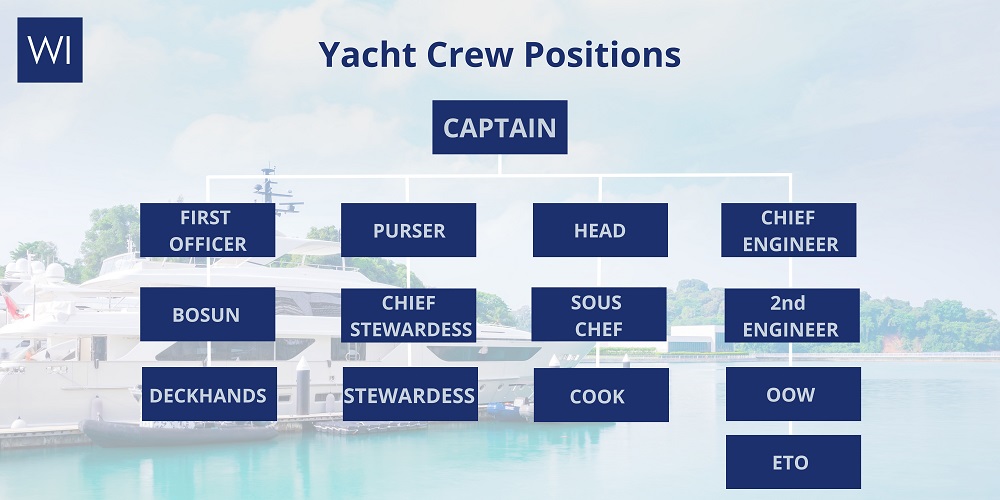
Working on a yacht is also living on the yacht. Crew must have a space to sleep, food, and all the basics that any employee needs. Large yachts have space reserved for crew, and owners looking for quality crew should provide good working and living conditions. Your crew takes care of you, and you should take care of them.
Depending on where a yacht operates or what flag she flies, a variety of labor laws or rules may be in effect. These requirements may be for work visas, contracts and written agreements, and compliance with merchant and ship crew treaties and laws. Be prepared to have work and non-disclosure agreements between yacht and crew, though a few yachts skip this.
Seasonal Jobs
Many yacht positions are seasonal. Year-round employment is more likely for senior crew like the captain and department heads, but not all yachts see year-round use. And some yachts may use different crew in different locales between seasonal moves.
Any job listing should give seasonal information, with geographic information, the length of the season, and the prospects for year-round positions and repeat employment.
Hours, Salaries, and Expectations
Yacht crew is a service job at its core, and every yacht owner is looking for service-oriented people who understand how to deliver a hotel-quality living and restaurant-quality fine dining. Work experience in luxury hotels and restaurants is a big plus for some jobs, and makes breaking into yacht work easier.
Yacht work can be very demanding, with periods of intense work when the owner and guests or a charter party is on board. Long days aren’t uncommon, but often balance with slack time when the boat is empty of passengers. There is always work to be done, but there’s usually a chance for time off.
Most salaries are monthly, since many positions are seasonal. Pay ranges are commensurate with experience, rank, and responsibility. Private vessels usually offer higher base pay, as charter crew can earn tips on top of their base salary. Because of the demands of the lifestyle, compensation is good and you have minimal living expenses on board.
Benefits and Time Off
Because so many jobs are seasonal and may occur in different countries and locations, benefits offered to yacht crew vary widely. But it is not uncommon for crew to be offered health and accident insurance and a flight to the vessel. Living on board, you’ll get food, rooming (usually shared), basic toiletries, uniforms, and laundry. Yachts with a longer view may offer additional training to long-term prospects.
Time off is usually linked to boat use, and may be sporadic in-season or when the boat has the owner and guests on board. There will always be some time off, but it may be between very intense work periods.
Most crew jobs have an employment contract that meets the Maritime Labour Convention 2006 (MLC). This should spell out the contract period and duration, as well as salary, leave and time off, probationary periods, repatriation policies, and any other crucial details to meet the minimum international standards of crew welfare.
This contract should also contain shipboard policies on confidentiality and non-disclosures, drug and alcohol use on board, personal hygiene expectations, interpersonal relationships, and dispute resolution. Job expectations and requirements can also be included, with specific language about roles, tasks, and cooperation between divisions.
Note that all crew agreements will explicitly prohibit drug use on board, most limit alcohol consumption and ban hard liquor on board, and many boats have policies prohibiting intimate personal crew relationships. Because the crew is living on board full time and in close quarters, rules to maintain decorum and crew harmony may be in writing.
Training & Certificates
Two key certifications are required for yacht crew. Employers look for the STCW (Standards of Training, Certification and Watch-keeping for Seafarers) and the ENG1 (Seafarer Medical Certificate). Insurers generally require crew to have these two certifications or the equivalent.
The ENG1 isn’t a class. It’s a medical exam to ensure that the crew is physically fit to serve at sea and has no underlying conditions that may arise far from help. It’s best for prospective crew to secure the ENG1 before investing more time and money training.
STCW is a week-long class on the basics of onboard safety. This includes hands-on modules covering personal survival, fire safety, first aid and CPR, accident prevention, and security awareness. It needs to be refreshed every five years.
Shared, Hybrid, and Crossover Jobs
Larger vessels will have more defined duties and specific areas of responsibility. But smaller yachts may want the crew to have different roles in different situations. For example, a hybrid job description may read “3rd Engineer/Steward” and describe a role in engineering when the boat is empty but on inside crew when passengers are on board.
When hiring or seeking jobs be prepared to look for creative crossover skill sets to meet the needs of the vessel.
Extra Skills and Duties
Any extra skills outside the regular duties makes crew more attractive. From stewards who can teach yoga, give massages or play cocktail piano to deck crew who know how to water ski, SCUBA dive, or fish, anything that crew can bring to enhance the passenger experience adds value to the employee.
If you’re looking for a position, list the skills you’d be comfortable using. If a vessel owner is looking for something specific, spell it out and figure out how that special duty fits into the employee work day.
The Four Main Divisions

Most yacht crews break into four primary divisions which group related tasks and responsibilities together. While the grouping sounds like it’s by section of the boat, they’re really more functional. For example, stewards (Interior) will definitely serve meals, whether they’re in the main dining room or out on deck. Deckhands (deck) are going to be involved in painting, sanding, and varnish jobs anywhere on the boat.
The deck crew handles most of the exterior operations of the yacht, and runs it. Deck hands and crew keep the boat looking clean and shiny, and handling most vessel operations. This includes driving and operating the yacht, navigation, running all launches and ship’s craft, handling lines, and all maintenance and painting, washing, and shining.
2-Interior (or Inside)
Inside crew are primarily the stewards and housekeepers. Larger vessels will have a dedicated housekeeping staff separate from the stewards, but smaller vessels may not.
Stewards keep the interior clean, do all housekeeping, laundry, food and beverage service, cabin preparation, and anything else needed for the comfort of the passengers.
3-Engineering
Below decks, the engineering department ensures the safe and smooth running of all the ship’s machinery and electronics. Engineers are engine and systems specialists, and there will usually be a dedicated electronics expert. Most engineer jobs require professional training and certification.
Fine dining is a hallmark of the yachting experience, and a full-time galley crew prepares all meals for passengers and crew. The head chef plans the menus and provisions the boat, while junior chefs assist the head chef with meal preparation and keeping the galley spotless.
Yacht Job and Department Details
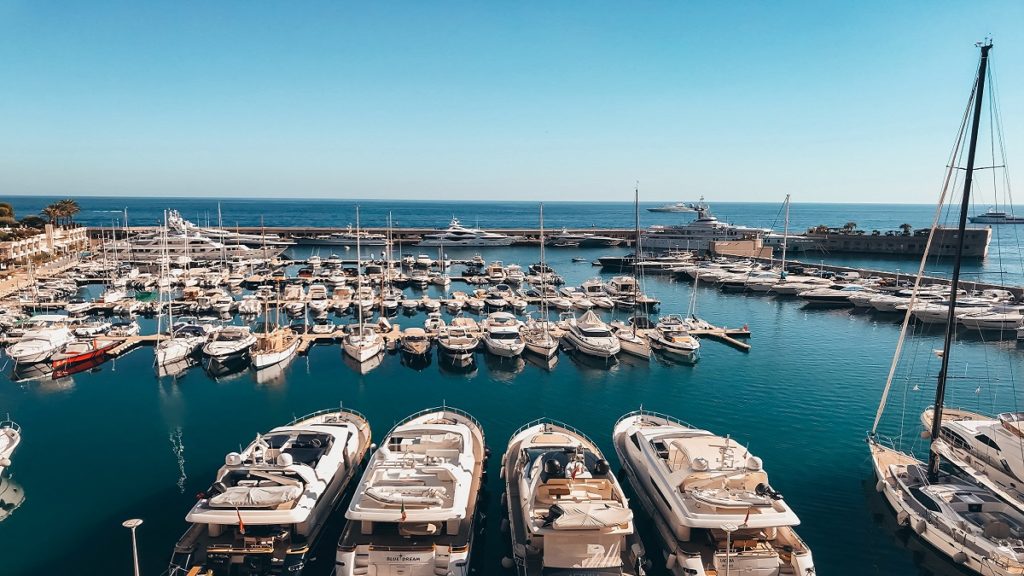
Departments are all organized in a hierarchy, with a department head reporting to the Captain. The clear chain of command makes for smooth operations, with all communications going up and down ranks. Junior staff will occasionally take instructions from other divisions as all crew is expected to help as needed. A captain or department head may organize staff differently, so reporting structures listed are guidelines only.
All salary ranges are monthly figures and are ranges based on yacht size and crew experience. Senior jobs on larger yachts have more responsibility than the same job title on yachts with smaller crews. Experienced crew are very desirable and can expect more pay for their positions.
Listed responsibilities are not exhaustive, and different yachts may allocate some jobs to different positions.
Read also: The yacht charter experience ladder
The Captain

The captain of the vessel is the overall decision maker for the yacht in all situations, including the safety of the vessel. The owner should leave the Captain responsible for operational decisions about hiring and staff and operating the ship. To become a captain requires years of experience and training, and a broad set of skills including yacht operations, personnel management, budgeting and finance. The captain works directly with the owner and owner’s representative, if the captain is not also acting as the representative.
On an organization chart, the Captain is usually placed in the deck division, but the Captain is always the senior-most crew on the yacht and all division heads report to the Captain.
Responsibilities include:
- Responsible for all navigation and running the yacht.
- Senior decision maker on all crew hiring.
- Manage repairs, refits, and yard work.
- Manage budgets and accounting. On larger yachts, this task ends more on the Purser, but the captain is always responsible.
- Ensure all paperwork, clearances, and legal requirements are completed.
- Primary contact with the owner or charter parties.
Reports to: The yacht owner
Salary Range: $6,000 to $22,000
The deckhands handle all the outside responsibilities of the ship, including cleaning and maintenance of the yacht and all the ship’s vessels and toys on board. Deck crew will have significant contact with passengers in this role, operating launches and delivering guests to and from shore and handling the toys.
All deck crew have watch responsibilities on passage, and daily responsibilities keeping the yacht pristine and clean. They will also do line handling and secure the yacht.
Deck department : Chief Mate/First Officer
The Chief Mate or First Officer is the second in command of the vessel, and left in charge when the Captain is not on board. The first mate has the requisite skills to stand in for the captain and run the yacht if needed and usually acts as the division head of the deck team.
The seamanship skills needed are similar to the Captain’s position.
- Primary safety officer for the yacht and all passengers and crew.
- Supervise and manage all operations on deck.
- Bridge watches on passage.
- Passage planning and navigation.
There may be additional mates on larger vessels, these 2nd, 3rd, etc. mates have similar responsibilities on rotation. But the first mate is senior and always second in command.
Reports to: Captain
Salary Range: $4,000 to $9,500 (First mate)
Second and more junior mates may earn $2,000 to $4,000
Deck department : Bosun
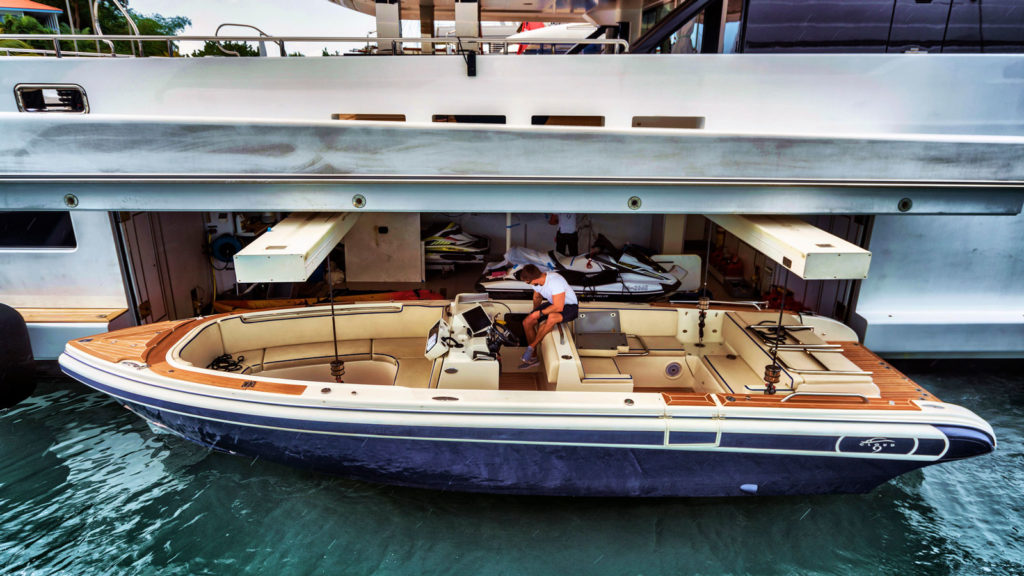
The Bosun is the senior deckhand and manages the junior hands on board. This will usually be the most experienced hand on board.
- Organizing all operations on deck.
- Coordinating the use, storing and launching of the ship’s boats, toys, and equipment.
- Managing the passerelle, watching passenger safety.
- Contact point for guest service on boats, toys, and trips to shore.
Reports to: First mate
Salary Range: $3,000 to $5,000
Deck department : Deckhands
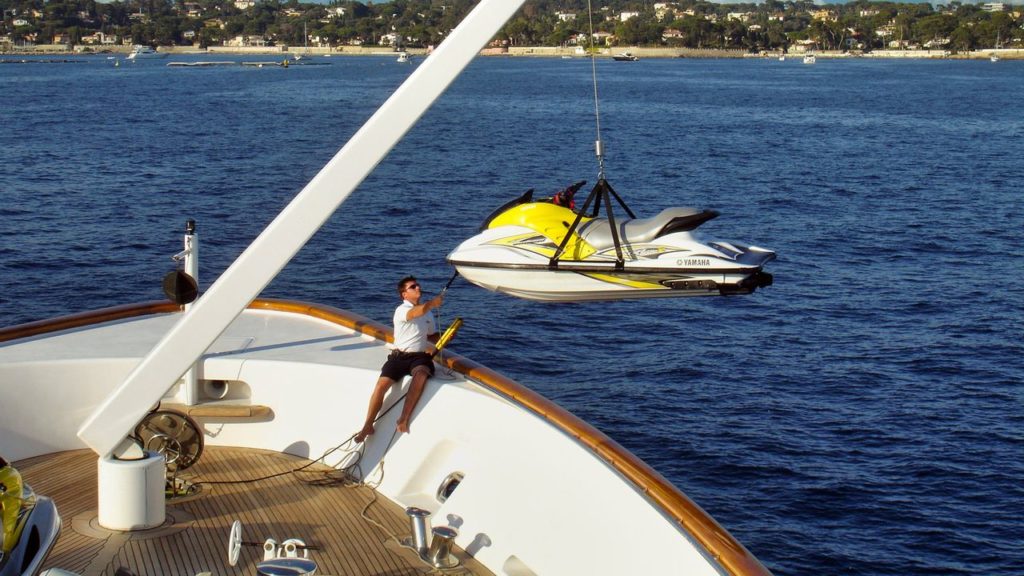
Deckhands are constantly busy with maintenance, cleaning, polishing, and assisting guests as needed. They will assist other departments as needed or given special duties.
- Daily cleaning of the yacht’s exterior.
- Painting, varnishing, polishing.
- Line handling.
- Launching and operating dinghies and tenders.
- Repairs and carpentry.
- Helping guests as needed – everything from handling baggage and gear to embarking and disembarking.
Reports to: Bosun
Salary range: $1,300 to $3,000
Though every position on a yacht is service-oriented, the interior or inside crew provides the primary customer service. They will interact the most with the passengers daily, and they’re directly responsible for the quality of their experience on board.
Interior department : the Purser

The purser is the chief financial officer of the yacht and handles all the financial operations on board. Accounting, purchasing, payroll and hiring, and all money matters end up with the Purser. This is a senior staff position, and may be the interior department head. Smaller yachts may eliminate the purser’s job and add it to the captain’s and other senior staff duties.
Responsibilities Include:
- Accounting and bookkeeping for all financial transactions.
- Human resources and payroll.
- Handling logistics for all departments related to purchasing.
- Managing contracts.
- Event coordination, including off yacht bookings and payments.
- Primary administration of the boat’s business paperwork.
- Inventory and supply management.
Salary Range: $4,000 to $8,000
Interior department : The Chief Steward/ess

The chief steward or stewardess has primary responsibility for all service roles inside. Food and drink service, cabin preparation, and anything to do with helping the passengers be more comfortable and enjoy their stay. The chief steward will be inside crew with several years of experience.
The chief steward manages the interior staff, setting and enforcing vessel service standards. The chief steward ensures the crew delivers a five-star hospitality experience.
Chief Steward Responsibilities:
- Scheduling and training junior crew for meal and drink service and cabin preparation.
- Primary contact with guests for meals and drinks.
- Sommelier and wine service.
- Coordinate with the galley for meals and presentation.
- Decorate the interior, from flower arrangement to table settings.
- Arrange onshore activities and outings.
Reports to: Captain or Purser, depending on the yacht
Salary Range: $4,000 to $8,500
Stewards/Stewardesses
The stewards and stewardesses are the primary guest service staff. They will work closely with guests and passengers, and have daily contact with them as they meet most of their needs while on board.
Steward Responsibilities:
- Food and drink service.
- Room preparation and turndown service.
- Cleaning, polishing, housekeeping, and inside maintenance.
- Cabin detailing.
- Laundry, pressing, and folding.
- Help with outings, trips, debarkations.
Reports to: Chief Steward
Salary Range: $1,500 to $4,500
Housekeeping

Larger yachts may have a dedicated housekeeping and laundry staff. This will be part of the inside crew, under either the purser or the head steward. There may be a senior housekeeper, if there are more than one housekeeping crew on board.
Responsibilities are the cleaning and laundry portions of the steward’s job, and a laundry steward may spend most of her time inside the ship’s laundry.
An experienced Head of Housekeeping may earn from $4,500 to $7,000, while a Laundry Steward typically earns from $2,500 to $3,500.
Read also: CAN OWNING A YACHT TO CHARTER (REALLY) BE PROFITABLE?
Food service requirements on any yacht are high. Whether it’s a privately owned vessel or a charter, the expectations are always for top tier food service, with a variety of meals planned for the requirements of every passenger. Chefs and cooks prepare all meals on board for passengers and crew, but sometimes other interior crew may help with prep work or cleanup.
Smaller yachts have smaller galley crews, but the largest vessels may have an executive chef and several sous chefs. All chef positions require formal culinary training and experience, but cook positions are often entry level. Promotion from cook to chef is unusual without additional training.
Galley department : the Head / Executive Chef

On larger yachts, an Executive Chef will run the entire galley with the help of sous chefs and cooks. With an Executive Chef, there’s an expectation that the food and menus will be on a level with Michelin star-rated restaurants.
The executive chef brings a thorough understanding of food preparation and presentation, and moves food preparation past creative up to artistic. Job responsibilities are similar to a chef, but the job demands and the required experience and education are much higher.
Salary range: $7,000 to $11,000
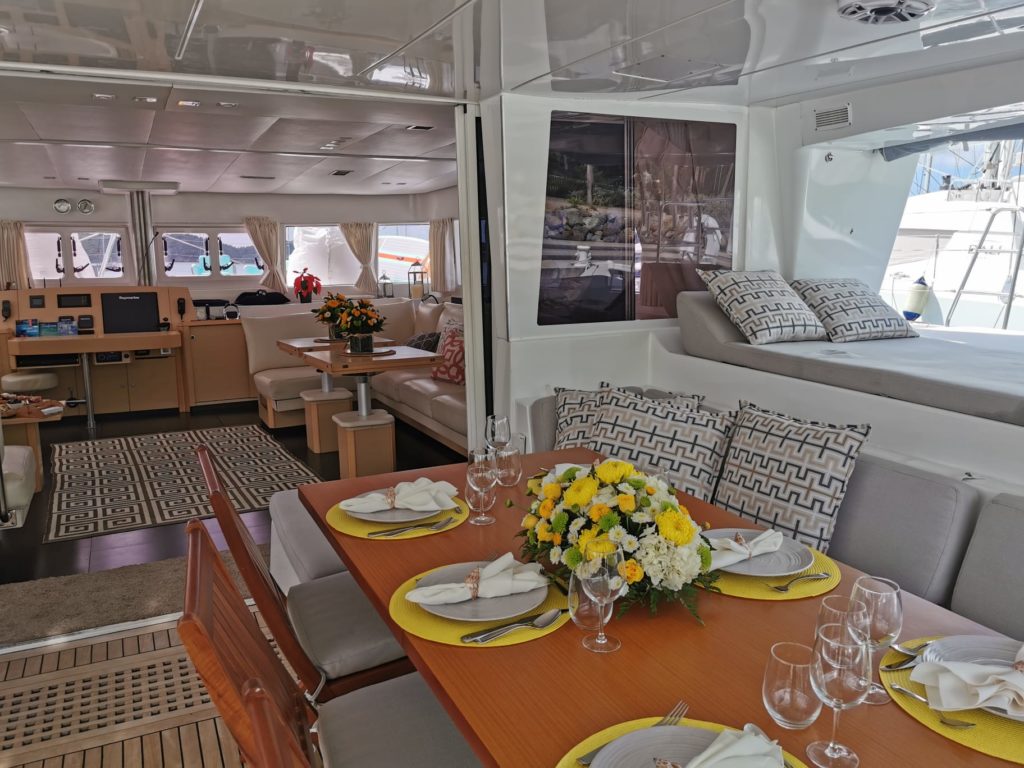
The chef has overall responsibility for all meals on the yacht, from provisioning in remote places to hygiene and good safety. If there’s only one chef, she’s the head of the galley crew. Finding the best provisions in far away locations and making the best of local food availability is a major part of the job.
- Planning a delicious and varied menu for passengers.
- Sourcing all food and arranging transport to the yacht.
- Maintaining and operating within the galley budget.
- Preparing passenger meals with professional presentation and style.
- Cleaning and maintaining galley and galley equipment.
- Deliver menus and meals on time, while running an organized and spotless galley.
Galley department : Sous Chef
The sous chefs assist the chef in all aspects of running the galley, and may have independent assignments to plan and guest and crew meals. While not primarily responsible for provisioning, the sous chef will help with food selection, menu preparation, and planning. A sous chef must have formal culinary training.
Reports to: Head chef
Salary Range: $3,500 – $6,000.

Galley department : The Cook
Cooks may be entry-level positions or experienced, but do not require formal gastronomy education. They will assist the chef and sous chefs, cooking meals and dishes for guests and crew, helping with provisioning, and keeping the galley neat.
- Assist with provisioning and buying high-quality food from local sources.
- Follow all food handling and safety guidelines.
- Assist the head chef as needed, taking direction and guidance.
- Prepare guest and crew meals as required.
- Staying on top of galley inventories and supplies.
Salary Range: $2,500 to $3,500
Engineering
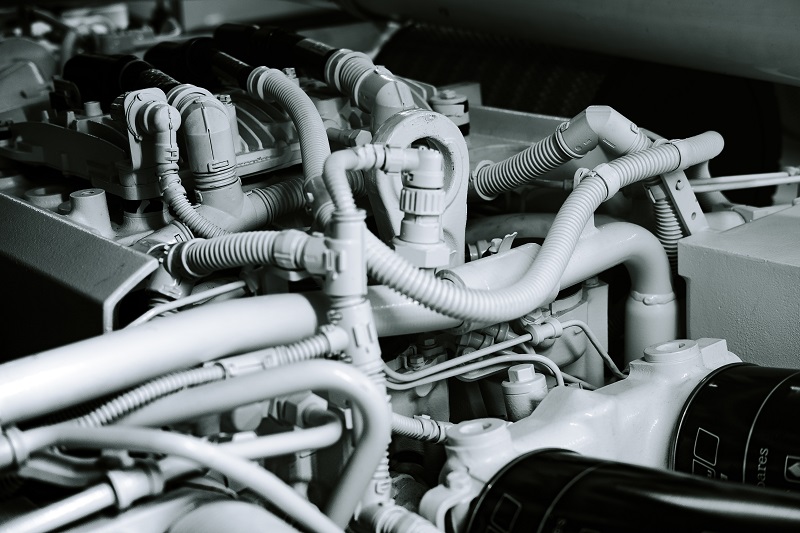
The engineering department keeps the yacht and all its systems working. Whether it’s the engines, electronics, air conditioning, or the plumbing – it’s up to engineering to keep it running.
There is considerable overlap with commercial shipping in the engineering field, as many of the same skills apply. And there is a broader range of qualifications and grades based on the size and power of the vessel. Job ratings may be set by required experience based on tonnage of ship or power of engines, with corresponding levels of pay and responsibility.
Unlike commercial shipping, engineers may get involved in other aspects of running the yacht, like helping with docking and water sports with mechanical toys.
Engineering certifications, training, ratings, experience and licensing are critical to hiring competent engineers, and for engineering crew it’s an important facet of career advancement. This is important for Chief and 2nd Engineers, which are often broken out by MCA (U.K. Maritime and Coastguard Agency) rating or other international equivalent.
MCA ratings for engineers Commercial and Private Yachts over 24m are:
Y4: Less than 200 Gross Tons and less than 1,500 kW engine power Y3: Less than 500 GT and 3,000 kW Y2: Less than 3,000 GT and 3,000 kW Y1: Less than 3,000 GT and 9,000 kW
There is also an unlimited rating for merchant vessels larger than the Y1 category. For discussing salary and responsibilities, we will include all ratings in one position description, but pay scales with the size of the yacht and any required higher ratings.
Chief Engineer
The chief engineer manages all aspects of keeping the yacht and its systems running. The chief engineer manages all the engineering staff, and directs all maintenance, repairs, troubleshooting and upgrades. This is a management position, but requires extensive hands-on technical experience and knowledge. Chief engineers on large yachts hold an MCA Y1 or Y2, smaller boats will have a lower rated chief and a smaller staff. Check Jooble.org to find abroad marine engineer vacancies.
- Provisioning, shopping, and stocking.
- Preparing passenger and crew meals.
- Following instructions and cooking under the direction of others.
- Galley cleaning.
- Follow food safety and storage procedures.
- Food pre-preparation.
Salary Range: $6,000 to $15,000
2nd Engineer
The second engineer is also a highly skilled position requiring a rating or license and several years of experience. This senior level engineer also needs knowledge of how to troubleshoot and maintain all yacht systems.
- Maintain and manage all engineering operations.
- Hire, train and supervise all engineers.
- Project manage all upgrades and retrofits, including managing budgets, contracts, and suppliers.
- Coordinate maintenance schedule for the entire yacht around the usage and seasonal schedules.
- Maintain costs and accounting for engineering operations.
- Design and handle all safety operations.
- Set and maintain standards for operations and cleanliness in the engine room.
Reports to: Chief engineer
Salary Range: $5,500 – $10,000
OOW (Officer of the Watch) Engineer
The OOW is a junior engineering position, but still licensed. There are two categories of OOW – MEOL (Marine Engine Operator License) and the more junior AEC (Assistant Engine Course). The overall responsibilities are similar, working to support the senior engineers and handle independent assignments. The AEC rating is entry level for licensed crew, but has training and certification.
- Support the chief in all projects.
- Maintain a clean, safe engine room.
- Perform all maintenance, troubleshooting and repair tasks as needed.
- Support motorized water sports.
- Occasionally assist with other vessel operations, like line handling.
Reports to: Chief Engineer
Salary Range, MEOL: $4,500 to $6,000 Salary Range, AEC: $2,500 to $3,500
Electronics/Technology Officer (ETO)
The ETO takes responsibility for all audio-visual and information technology on board. Ensuring passengers have access to the internet, movies, television, and music is a primary responsibility. This position carries a fair amount of passenger interaction, and an ETO needs good troubleshooting skills to go with customer service skills.
- Ensure all audio/visual and entertainment systems are always available for passengers.
- Assist passengers with personal technology and ship systems as needed.
- Conduct regular maintenance and upgrades of the network, information, and A/V systems around passenger schedules.
- Assist other engineers as needed, especially with electronic systems.
- Contribute as needed with other departments for boat and passenger operations.
Salary Range: $4,000 to $9,000
Junior Engineer
This is a lower or entry level position for someone with engineering skills but without formal licensing or certification. The junior engineer will help with safety and cleanliness, and assist in any engineering tasks as needed. The ability to solve problems and fix things opens this spot for anyone capable and willing to do the job.
- Help with cleaning, maintenance, and safety functions.
- Help anywhere needed on the yacht.
- Assist senior engineers as needed, taking direction and following instructions exactly.
- Constantly develop skills.
Read also: IS BUYING A BOAT A BAD IDEA?
Whether you are a yacht owner or considering entering this dynamic industry with an established and reliable crew, it is essential to have an understanding of the yacht’s hierarchical structure, mission priorities, and salary expectations. By doing your research on the complexity of yachting before hiring your team, you can confidently select the right group of experienced and qualified professionals for your needs. Staying up-to-date on top industry trends and knowing the capabilities of each type of yacht crew position will enable you to make sound decisions that support a safe and cost-effective journey. With quality personnel at your helm, you can cruise unhindered in luxury and explore new destinations with peace of mind.
Yachts in Below Deck: All Boats of the TV Show (& their Prices!)
What is the best country to register your yacht offshore, you might also like.

What differentiates a yacht from a superyacht or a mega yacht?
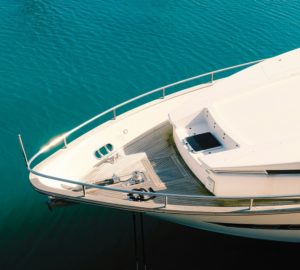
Chartering Requirements and Regulations: A Guide for Boat Owners

What are the Fastest Cruising Catamaran on the Market?
Essential Guides
Ocean Mapping
New to Yachting
How to use the data presented here
The table has been drawn up with the information collated with figures from the past year within various yacht departments. Please note that they an indication only of starting salaries and the actual salary will vary depending on multiple factors.
Many elements need to be taken into consideration with regards to yacht crew salaries and not just the size of the yacht. The type of yacht (motor or sail), its usage (private, charter or both) and cruising schedule will influence the salary offered. Additionally, key elements of the candidate’s profile must also be reviewed, what is their previous experience, how long have they been in a particular role, have they recently acquired a new qualification, and do they have a specialised skill set that will influence the salary negotiation?
The highlighted section corresponds to yachts who offer a scheduled leave or rotational package.
Salaries here need to be modulated in accordance with the type of rotation offered, 5:1; 3:1 or 2:2 for example. There may be several different rotational schemes on a particular yacht, 5:1 for the junior crew, 3:1 for the intermediary position and full rotation for positions of responsibility.
The rotational salary is generally only a reduced monthly reduction (between 10 and 20%) and allows for a larger pool of candidates who are fully committed to the yacht, its programme and owner.
For many key roles, professional qualifications are the basis to establishing a guideline salary, notably in the Engineering and Officer’s Department.
Following the effects of the Covid-19 pandemic on the yachting industry in 2020, the past 2021 was considered the year of revival for yacht crew placement.
With regards to salaries, the market saw a return to stability and no major new trends were recorded. There is always increased pressure to offer a scheduled leave or rotational scheme that now starts with yachts in the 40 to 50 metre range.
HOW MUCH DOES YACHT CREW EARN
Yacht crew salary guide.
After two exceptional years of dealing with Covid 19 and the impact it had on recruiting, the past year was very upbeat and fast-paced for yacht crew placement. The most significant trend was the extension of scheduled or rotational leave to positions outside of the engine room and the bridge.
The search and placement market has changed and crew are increasingly seeking a harmonious work-life balance. Although yachting salaries and leave packages are generally competitive, we have found that yachts need to be increasingly flexible to attract the best crew. Flexibility with regards to leave has become a key factor for all departments and allows for a larger pool of candidates who are fully committed to the yacht, its programme and owner.

Improved Leave Packages For Yacht Crew
Both the Deck/Bosun’s and the Interior/Galley Departments have witnessed a steady trend towards increased leave packages. For example, Senior Stews are now looking for a minimum of 90 days leave and 95% of the Chief Stews are looking for full rotation. Many Stew Head of Departments have come to realize that they too can benefit from scheduled or rotational leave that has in the past been reserved for the Engineers or Officer/Captains Departments.
Additionally, and in order to compete with the larger yachts, an important number of yachts under 70metres are now also considering increased leave packages to secure top crew.
Please note that the salaries below are an indication only of starting salaries and that the actual salary will vary depending on multiple factors; job specific skills, professional qualifications and experience.
YPI CREW now offers a bespoke service for our yacht clients to assist with salary reviews and comparative analysis. Contact [email protected] for any further information.
Deck Department
All the Captain and Officer salaries will depend on experience and maritime qualifications.
* On smaller yachts the First Officer is generally referred to as the Mate or First Mate. On yachts over 100m / 3000GT there are often two distinct roles for a First Officer and a Chief Officer.
** Specialised Deckhand positions will englobe a Deckhand Tender Driver, Kite Surfer, Carpenter, Diver etc.
Sole/Chief Engineer:
For 30m — 40m the salary is based on the candidates holding an AEC/Y4
For 40m — 50m the salary is based on the candidates holding a Y3 / SV Chief 3000kw
For 50m — 70m the salary is based on the candidates holding a Y2 / SV Chief 9000kw
For 70m — 80m the salary is based on the candidates holding a Y1 / SV Chief 9000kw
For 80m — 100m the salary is based on the candidates holding a Y1/Class I
For 100m+ the salary is based on the candidates holding a Class I
Second Engineer:
For 40m — 50m the salary is based on the candidates holding an AEC
For 50m — 70m the salary is based on the candidates holding a Y3 / SV Chief 3000kw and on rotation. If the role is permanent then an EOOW qualification is required and the salary would be 5 000—6 500€
For 70m — 80m the salary is based on the candidates holding a Y3 / SV Chief 3000kw
For 80m — 100m the salary is based on the candidates holding a Y2/Class II
For 100m+ the salary is based on the candidates holding a Class I/Class II
Third Engineer:
For 70m — 80m the salary is based on the candidates holding a AEC
For 80m — 100m the salary is based on the candidates holding an EOOW - equal rotation or 4:2 for example
For 100m+ the salary is based on the candidates holding an EOOW - equal rotation or 4:2 for example
For 80m — 100m the salary is based on the candidates holding a STCW III/4
For 100m+ the salary is based on the candidates holding a STCW III/4
Are you ready to find your new ideal job on board a yacht?
Become a member of YPI CREW and connect with our recruiters so they can guide you through your job search.
Each of our recruiters is specialised in crew placement for a particular department and they will do their best to get you an interview on board a yacht. They will also advise you on how to best present your experience and skills and prepare for a yacht job interview.
Are you looking for yacht crew for your yacht?
Contact our recruiters who will strive to find the perfect fit to your existing crew by presenting suitable, available and interested candidates, who will be pre-interviewed and credentials checked.
You can get in touch with us today by clicking here .
Explore the latest in yachting

YPI CREW Will be Attending the Superyacht Technology Network Conference in Barcelona

Is a career in the yachting industry a good fit for me?

Webinar Friday, 15th March: How to Start Your Yachting Career as a Superyacht Stew?

YPI CREW TEAM
Meet our recruitment team.

YACHT CREW GUIDES
Download free yachting cv templates, let’s get started. call us on +33 (0)4 92 90 46 10 or email us..

Engineering Department
Chef department.
* No yachting experience
** Rotational positions start at 6 000€ while non-rotational positions start at 7 000€ *** Combined Cook/Stew or Cook/Deck role **** Lower end refers to crew with no yachting experience
***** Rotational positions start at 4 500€ while non-rotational positions start at 5 000€
More and more yachts, from 30m+, are offering rotation at all levels in the galley in order to secure the best candidate on the market.
Interior Department
Specialist Positions
30m — 40m
40m — 50m
50m — 70m
70m — 80m
80m — 100m
Chief Officer
First Officer*
Second Officer
Third Officer
Specialised Deckhand**
Deckhand Junior
4 500—6 000
45–60 days
3 500—4 500
2 800—3 000
45 days
6 000—9 000
3 500—5 500
8 000—13 000
45–60 days or equal rotation
5 500—7 000
50–60 days
3 800—4 000
9 000—18 000
60-90 days or equal rotation
6 000—7 500
5 000—6 500
5 000—5 500
60–90 days
14 000—20 000
7 000—9 500
5 500—6 500
61-90 days or equal rotation
4 000—5 000
3:1 rotation
90 days or 3:1 rotation
15 000—23 000
8 500—11 000
62-90 days or equal rotation
Discretionary
Equal rotation
9 500 + discretionary
7 500—10 000
6 500—7 500
4 500—5 500
3:1 rotation or equal rotation
Salary (€)
Chief Engineer
1st Engineer
Second Engineer
Third Engineer
ETO & AV/IT
4 000—6 000
Non-rotational
5 000—8 000
Non-rotational or equal rotation
7 500—10 000+
6 500—7 000
Non rotation or rotation
6 000—7 000
11 000—15 000+
7 000 — 8 000
Non-rotation or rotation
3 200—4 000
7 000—8 000+
13 000—15 000+
8 500—10 000
8 000—10 000
Head Chef/Sole Chef
4 500*—5 500
5 000—6 000
2:2 rotation or non-rotational
6 000—8 500
4 000—5 000***
6 000**—9 000
4 000****—6 000
4 500*****—6 000
2:2 rotation
Head of Service
Head of Housekeeping
Experienced Stew 1–3 years experience
Junior Stew 0–1 years experience
3 500—4 000
2 800—3 300
4 000—5 500
3 000—4 500
3 000—4 500
4 500—6 000
3 800—4 250
6 500—8 000
90 days+ or equal rotation
5 500—8 000
60 days+, 90 days+ or equal rotation
4 250—5 500
60 days+ or 90 days+
7 000—8 000
equal rotation
90 days+ or equal rotation
4500—5 500
8 000—9 500
7 000—8 500
5 000—6 000
Spa Manager (with yachting experience)
Spa Therapist (with advanced level training)
Masseuse / Beautician (with basic training courses)
Personal Trainer
Laundry Master
3 300—4 500
4 000—4 500
4 000—5 000
90 days + or equal rotation
Our Mission, Vision and Values
Mlc 2006 compliance, essential guides, yacht crew positions.
Interior Crew
Spa Manager
Spa Therapist
Personal Trainer & Yoga Instructor
Hairdresser
Mandatory Certificates
B1/b2 visa information, how to write a memorable cv, how to prepare for an interview, yachting seasons, yacht crew salary guide, is yachting the right choice for me, cv templates, ocean mapping, new to yachting.
+33 (0)4 92 90 46 10
Superyacht Crew Salaries: First Report Released
- Inspiration
Related News
Popular news this week, popular news this month, latest news.
- Yacht Charter & Superyacht News >
Written by Maria Korotaeva
Many life-long careers in the yachting industry have begun as a seasonal job or gap year with a desire to visit exotic destinations. The continual change and challenges that come with each new charter group make the positive feedback even more satisfying and those with lifelong wanderlust have a rare opportunity to see some of the world’s most incredible cities and scenery .
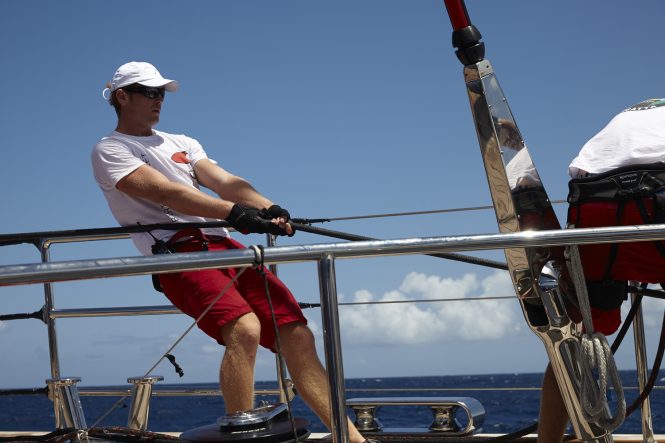
Seahwak’s Crew
Working on a luxury yacht isn’t without its drawbacks, however: Weeks at a time spent away from home, long working hours in the peak seasons and ensuring that everything runs smoothly when you’re far from the port can all take their toll. When performing tasks that can be as equally trying as they are rewarding, crew members want to assure that their pay reflects the professionalism and high degree of detail that they put into each day.
Following the launch of free salary-sharing platform www.yachtingsalaries.com in March 2016, YPI CREW has revealed its first report into the salaries paid to the crew on luxury yachts of various sizes.
Covering the period between 2016/2017, the results not only provide transparency to crew members but help employers to attract and retain individuals with exceptional skills. The occupations covered range from captains to deckhands and compare pay for permanent, private, rotation and charter crew: Find out how the charter industry measures up to the other sectors.
446 captains submitted information to www.yachtingsalaries.com, and the data revealed that 13% worked on sailing yachts and the other 83% on motor yachts. Captains on larger yachts earned more per month than captains of smaller vessels to create an upward trend, although M/Y captains of 35m-51m superyachts fared particularly well, with a jump in salary from €9,000 per month for 41m-50m yachts up to €13,000 p/m for larger luxury yachts. Private and permanent captains tended to earn the most for their size category, with permanent captains coming out slightly ahead.
Sailing yacht captains tended to earn the same as on motor yachts for the 0-35m and 35-40m vessels, earned more than motor yacht captains in the 41-50m category by €2,000 per month, and earned less than motor yacht captains by €2,000 in the 51-65m category.
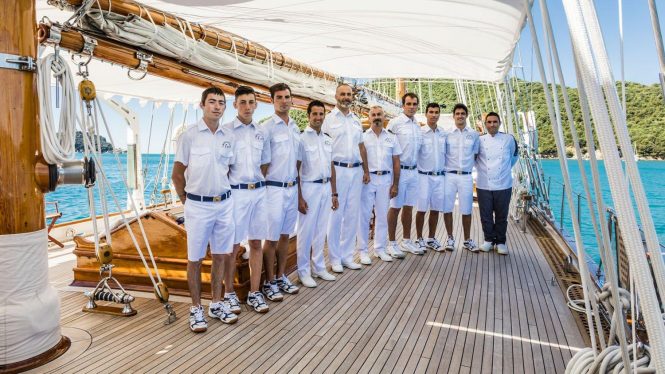
Crew aboard Crose Del Sud
Technical Crew
239 of the 434 technical crew surveyed were chief engineers, and on charter yachts, they earned an excellent salary compared to private, permanent and rotational counterparts on the same-sized yacht: In the 0-35m size category, they earned €6,000 per month compared to €5,500. Salary levelled off in the 80-100m category, with chief engineers on charters earning slightly less than others with a salary of €9,500.
Second engineers were the most stable across the sectors and received a steady pay of between €48,000, rising to €70,000 on the largest yachts. Second engineers on charter yachts were paid considerably more per month than permanent and private second engineers within the 51-65m and 66-80m categories, earning between €5,000-€10,000 more in the former category and €2,000-€5,000 per month more in the latter.
Third engineers earned between €2,500 and €5,000 per month, with the pay scale raising incrementally based on yacht size.
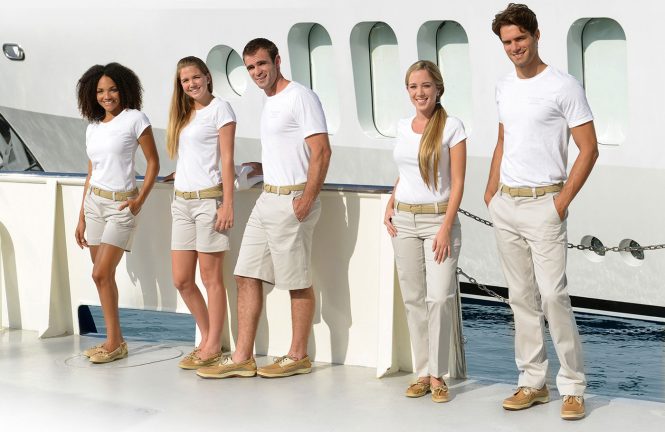
Luxury superyacht crew
Deck officers
69% of the 224 deck officers who took part in the survey were permanent and 31% rotational. Second and third officers had a greater chance of occupying a rotational position (50% and 70%), making deck officers the most likely crew members to have rotational work. Deck officers on charter yachts tended to earn less than counterparts on similarly-sized vessels, and private and permanent positions provide the most stable throughout.
Salaries for chief officers on charter yachts ranged from under €4,000 per month on 0-35m vessels to over €8,000 on 81-100m vessels and dropping slightly in the category of 101+m
Data for 2nd and 3rd officers was more sporadic, and charter position salaries ranged from €3,800 for both positions on yachts 51-65m and upwards.
Although 127 chefs participated in the survey, results were varied both for yacht sizes and sectors, producing the unusual graph where the head chefs on a 0-35m and 66-80m yacht were earning approximately the same (€4,000 per month) while on other sized charter yachts the head chefs were earning between €5,000 and €8,000. Of the head chefs who submitted data. 85% were permanent and 15% on rotation.

Dining aboard superyacht SuRi
Vessel size seemed to play a part in the salary of sous chefs, with each type of employees earning more on larger yachts. 71% were permanent, and 29% were temporary.
Pursers, Stewards and Stewardesses
For the 2016/2017 report, only 27 pursers, 68 chief stewards/stewardesses and 27-second stewards/stewardesses provided information, and there are therefore too few results to make solid conclusions about industry salaries in this area. Of the pursers, salary varies from €5,000 per month to €7,000 and remuneration did not have any correlation with the size of the yacht and salary was stable regardless of the type of employment, although results were the most unstable in the 66-80m category.

Excellent service onboard
Chief stewards and stewardesses received greater salaries for working on larger yachts, with rotation, permanent and private employment having the most stable salaries and charter crew the most variable: salary on a 51-65m superyacht was €6,500 per month, whereas under €6,000 was paid to stewards and stewardesses aboard 66-80m vessels and smaller yachts.
The results of the second stewards and stewardesses had the most variability, with charter and rotation crew earning under €3,000 for 66-80m vessels while private and permanent crew earned €5,000.
Deckhands
Deckhand salaries tended not to vary depending on the size of the vessel, and 93% were permanent and 7% on rotation aboard motor yachts, while sailing yachts had 100%, permanent crew. From the 87 deckhands that contributed to the study, data revealed that salaries tended to range between €2,100 – €3,000 per month, regardless of whether the yacht was a charter, private or permanent. Deckhands on rotation earned €3,000-€9,000 less depending on the size of the yacht.
The website www.yachtingsalaries.com currently has 2,857 searchable salaries and includes other professions such as bosun and helicopter pilot, as well as the full comprehensive report. Results are searchable at any time, and the next report is due in November 2018.
Please contact CharterWorld - the luxury yacht charter specialist - for more on superyacht news item "Superyacht Crew Salaries: First Report Released ".
- Charity & Fund Raising
- CharterWorld News
- Classic Yachts
- Coronavirus
- Cruise Ship
- Ecological Yachts
- Expedition Yachts
- Expert Broker Advice
- Feature Superyachts
- Interior Design
- Legal & VAT Yacht Issues
- Luxury Catamarans
- Luxury Gulet
- Luxury Phinisi
- Luxury Trimarans
- Luxury Yacht Design
- Luxury Yachts
- Marinas & Harbours
- Marine Ecology
- Marine Electronics
- Marine Equipment
- Mega Yachts
- Modern Yachts
- Motor Yachts
- New Launch Yachts
- New To Charter
- Open Style Sports Yachts
- Private Jets
- Sailing Yachts
- Social Media
- Sports Yachts
- Superyacht Crew
- Superyacht Photographers
- Superyacht Products & Supplies
- Superyacht Refits
- Superyacht Reviews
- Superyachts
- Uncategorized
- Yacht Builders
- Yacht Charter
- Yacht Charter Destinations
- Yacht Charter Picks
- Yacht Charter Specials
- Yacht Delivered to Owner
- Yacht Designers
- Yacht Events & Boat Shows
- Yacht Fashion
- Yacht Industry News
- Yacht Photos
- Yacht Racing
- Yacht Racing & Regattas
- Yacht Safety Equipment
- Yacht Support Vessels
- Yacht Tenders
- Yacht Videos
- Yachting Associations
- Yachting Awards
- Yachting Business
- Yachts For Charter
- Yachts For Sale
Quick Enquiry
Superyacht news:.
Email Your Yachting News to: news @ charterworld.com

Viking Recruitment expands and moves office
The 2010 Genoa Charter Yacht Show Starts Tomorrow and Features Superyacht ICON 62, TRIDENT, BISTANGO and CLOUD NINE
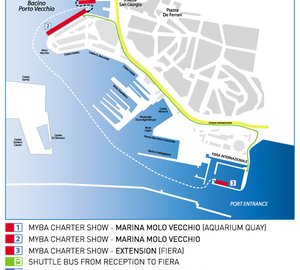
2011 MYBA Genoa Yacht Charter Show expands with extra dockage

Inaugural Superyacht Captains Forum in Auckland a success – Superyacht Captains enjoy Pacific tour
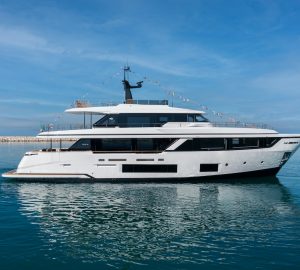
Ferretti Custom Line Navetta 30 series motor yacht GINDUNGO hits water in Italy
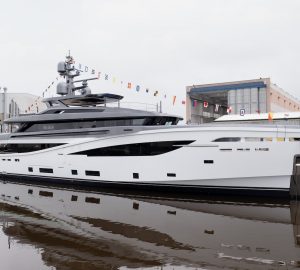
50m luxury motor yacht BEL1 launched in Pisa by Rossinavi
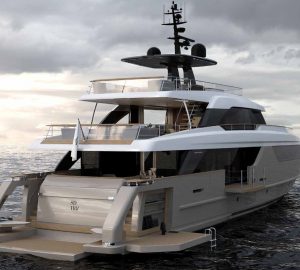
Luxury yacht UNIQUE S is brand new to the charter market in the Western Mediterranean
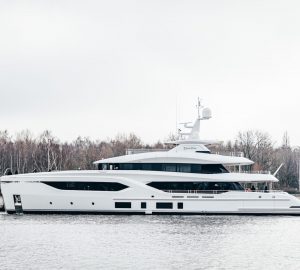
44m superyacht EXTRA TIME new to charter around the Western Mediterranean

Baglietto announces the launch of 41m luxury yacht ASTERA

Superyacht KISMET – the 122m Lurssen motor yacht the charter market has been waiting for

Another great special offer on board 36m motor yacht CALYPSO I
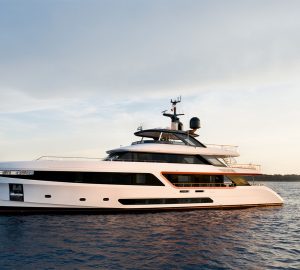
37m luxury yacht LEGEND offering unparalleled comfort on charters in the Western Mediterranean
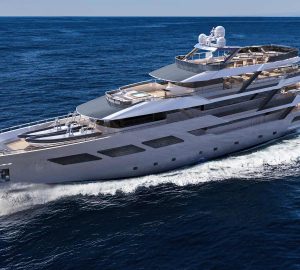
Discover our Top 10 brand new yachts available for charter worldwide this year
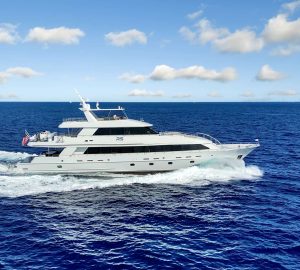
Florida charter yacht REAL SUMMERTIME offering 10% discount
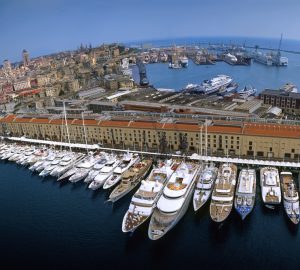
Looking ahead to the 2024 MYBA Charter Show in Genoa
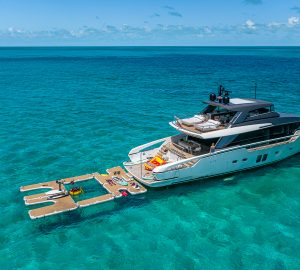
Discover summer in New England aboard a luxury charter yacht: Escape to this beautiful northeast corner of the USA
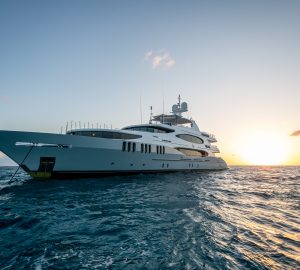
Last minute yacht charter deals in the Bahamas

Westport announce the first hull of their 36m W117 range is nearing completion

49m sailing yacht ANIMA MARIS is offering discounted rates for the remaining summer weeks in Croatia
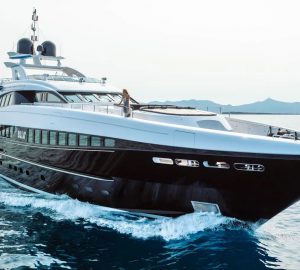
Take advantage of the exceptional 15% discount by 44m charter yacht BLISS in Greece

Yacht Crew Salaries: Complete Guide to What Yacht Crew Earn
It’s no secret that the impressive yacht crew salaries attract most people into the exclusive yachting world.
Junior deckhands or stewardesses can earn starting salaries of $3000 per month. With a few years of experience and some courses to back you up, this amount moves up towards $4000-$4500 per month!
In order to compile this superyacht crew salary guideline, I have taken 10 of the top yachting platforms and used all of their data, combined with my personal experience, to reach an average salary expectation for each position.
Table of Contents
How Much do you Make Working on a Yacht?

Yacht Captain Salary
- 20m-30m: $4000-$7500
- 30m-40m: $5500-$9500
- 40m-50m: $8000-$15000
- 50m-70m: $13000-$19000
- 70m+: $16500+
Requirements of a Yacht Captain
- Years of experience needed: 3-5 years of experience as Chief Officer/Mate and more than 5 years of experience as a Captain for larger yachts
- Minimum level of Qualification: 200ton licence which allows you to drive vessels below 200tons
The Captain has the highest level of responsibility onboard the yacht and hence they earn the most out of all the yacht crew salaries.
Captains are accountable for the overall safety of the yacht, crew members and guests.
They also handle daily operations of the yacht, guests, and owner liaison. They deal with management companies, port control, budgets, human resources, and many more tasks and logistics that make the job demanding and stressful.
On top of this, Captains are required to hold high levels of certifications depending on the size of the yacht they are driving.
Yacht Captain salaries can sky rocket with higher levels of qualifications.
If you are looking to become a Yacht Captain one day I recommend looking into the courses required so you can get started with licenses and sea time. It takes time to get there, but when you do it will be worth it.

Chief Officer Yacht Salary
- 30m-40m: $4000-$6000
- 40m-50m: $4500-$7500
- 50m-70m: $5500-$9000
- 70m+: $8000+

Requirements of a Chief Officer
- Years of experience needed: 3-5 Years
- Minimum level of qualification: Officer of the Watch
The Chief Officer is second in command to the Captain and is responsible for carrying out the Captain’s standing orders.
On smaller yachts, the Chief Officer is referred to as the Mate.
The Chief Officer is responsible for carrying out the safety duties onboard and assisting in the bridge with paperwork and navigational planning.
The Chief Officer is also responsible for leading and managing their deck team, ensuring crew are following their duties as well as managing the water sports and guest activities.
The salary of a Chief Officer depends heavily on the license held.

Bosun Yacht Salary
- Years of experience needed: 2-3 years
- Minimum level of qualification: Yacht Master Offshore
- A yacht Bosun salary can vary between $4000 and $6000.
Responsibilities of a Bosun
The Bosun is essentially the Lead Deckhand onboard. A lead deckhand salary on a larger vessel will be similar to that of a bosun salary on a smaller vessel.
This is an opportunity to step up from being a deckhand and gain some experience in a leadership role. This position is in place for larger yachts so that when the Officer is busy with bridge duties, someone is in charge on deck.

Yacht Deckhand Salary
Years of experience needed: 0
- Minimum level of qualification: None needed, however Power Boat Level 2 and Yacht Master offshore will put you at a great advantage
- Entry-level yacht crew salaries start at $3000 and can go as high as $4000/$4500.
Responsibilities of a Deckhand
A Deckhand is an entry-level role on a yacht.
You need to spend a few years (or less) as a Deckhand in order to learn and gain experience so that you can step up in the ranks and obtain your licenses.
This role will be very hands-on in maintaining the exterior of the yacht. Duties will include cleaning, polishing, varnishing, sanding, caulking, and any other maintenance work required.
Chief Steward / Chief Stewardess Salary
- 30m-40m :$4500-$5500
- 40m-50m :$5000-$7000
- 50m-70m- $5500-$8000
- 70m+: $7500+
Responsibilities of a Chief Stewardess/Steward
- Years of experience needed: 3-5 years
- Minimum level of qualification: Depending on the size of the vessel you may need courses such as Food Hygiene and Safety, Silver Service, WSET, or a Purser course
The Chief Stewardess or Steward is responsible for all the interior operations of the yacht .
They are responsible for managing the interior team, and ensuring the interior of the yacht is maintained to the highest standards. Besides cleaning and laundry schedules , this also includes provisioning for crew and guests, budgeting, accounting, and training of junior crew.

Steward or Stewardess Yacht Salary
- Minimum level of qualification: Depending on the size of the vessel you may need courses such as Food Hygiene and Safety and Silver Service
- Salaries start at $3000 and go up to $6000
Responsibilities of a Steward or Stewardess
A Stewardess/Steward is an entry-level position working within the interior of the yacht.
There are rankings within the interior (2nd, 3rd, 4th Steward/Stewardesses). As you spend more time in the industry, you will be promoted to higher ranks, and with that will come a better salary and more responsibility.
This role covers a range of tasks, including but not limited to housekeeping, laundry, bartending, table scaping, floral arrangements, serving, and hosting guests.

Engineer Yacht Salary
- 20m-30m: $4000-$5000
- 30m-40m: $4500-$6500
- 40m-50m: $6000-$8000
- 50m-70m: $7500-$11000
- 70m+: $9000+
Requirements of an Engineer
- Years of experience needed: 2-4 years in an engineering role onboard as Deck/Engineer or relevant land-based experience
- Minimum level of qualification: AEC
The Engineer onboard is responsible for all mechanical functioning and maintenance of the vessel. This is a very technical role that can pay well as you gain experience and obtain your licensing.
Yacht Chef Salary
- 20m-30m: $4000 – $5000
- 40m-50m: $5500 – $75000
- 50m-70m: $6500-$9500
Requirements of a Yacht Chef
- Years of experience needed: 3-5 years depending on previous experience
- Minimum level of qualification: Food Hygiene and Safety Level 2
The Chef is responsible for feeding the crew 2 to 3 healthy and sustainable meals a day. They are of course required to prepare meals for guests when onboard to the highest of standards.
In their day-to-day tasks, they will be responsible for their own provisioning of the galley, maintaining stocks, cleanliness, and hygiene of the galley.
The salary of the Yacht Chef varies depending on qualifications and experience.

Yacht Crew Salaries for Private vs Charter Yachts
There are two types of super yachts that require crew: Private and Charter yachts. The salaries for yacht crew differ slightly between the two.
Private Yacht
A private boat is owned by a single person or family who uses the yacht for their own purposes. They don’t charter it out and you can expect to have the same guests onboard for the duration of your contract.
The benefit of these programs is that you get to know your guests well so you may find it easier to manage their wants and needs.
You may also benefit from traveling to off-the-beaten-track locations as I have!
For yacht crew working on these private boats, you will usually not receive charter tips.
Charter Yacht
A charter boat is one that gets chartered out by guests. This operates as a business and also means you will have different guests for every trip.
If you work on a charter boat you can expect to receive charter tips at the end of each charter. These are usually 10%-20% of the charter fee!
Considering these tips can be anywhere from $2000-$5000 per week depending on the size of the yacht, charter boats offer great earning potential and can skyrocket your salary as a yachtie.

Hi, my name is Lisa, a Chief Stewardess in the yachting industry with 10 years of experience, as well as 8 years of hospitality experience prior to that. Being in the yachting industry has been a whirlwind of adventure, growth, challenges and some of the best experiences of my life, and I am excited to share my knowledge and experiences with all of you.
How to Write the Perfect Yacht CV [With Template]
A day in the life of a yacht stewardess.

The Quick and Easy Guide to Superyacht Engineering Careers
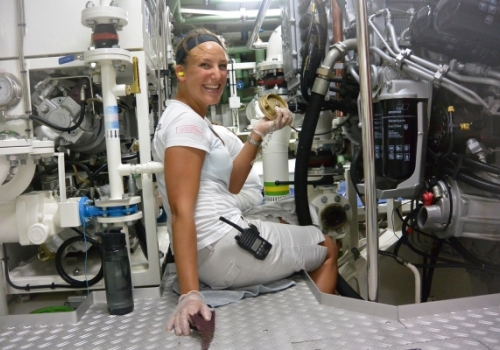
Following on from our guides on superyacht deck and interior careers, it’s time to get our technical hats on and lay out the career pathways for engineering, whether you’re transitioning from another sector or gunning for a chief engineer role.
As always, to keep us on track with the latest training requirements for superyacht engineers, we follow guidance from the experts at the careers guidance platform, Academy by Ephemeris .
What does a superyacht engineer do?
The role of a superyacht engineer varies depending on the size, type and usage of the yacht, and you might be working as a sole engineer, or as part of a team of six or more.
On smaller yachts you will be responsible for the operation, maintenance and repair of all mechanical, electronic, electric, hydraulic, pneumatic systems, and in some instances, also the structural systems and appendages on board.
Notably, on larger yachts there is usually a separation of function between the engineer and the electro-technical officer (ETO) who is responsible for the day-to-day maintenance and operation of all electronic, electrical, communications and audio-visual equipment. This could include radio, radar, telephones, satellite communications (including internet), navigation systems, email servers, TV, sound systems, and security equipment. We will cover how to get ahead on the superyacht ETO careers pathway in our next article.
How do I become a superyacht engineer?
There are two common routes for becoming a superyacht engineer. Firstly, you can enroll in the courses set out by the Maritime and Coastguard Agency (MCA) and work your way through them from the bottom up. These include the Approved Engine Course (AEC), the Marine Engine Operator License (MEOL), and the Yacht 4, 3, 2 and 1 qualifications (with Yacht 4 being the lowest of the four).
Before taking on the Yacht 4 qualification, candidates must already have the MEOL and AEC certificates, or hold an eligible amount of previous experience in another sector first, after which they can progress through the other levels. This is the ideal route if you are totally new to the industry and don’t yet have any practical experience.
The second route to becoming a superyacht engineer involves gaining a relevant qualification, such as a degree in maritime, aerospace or mechanical engineering, before embarking on your yachting career.
The advantage of this option is that you will have a degree under your belt if you decide to change careers later in life. The disadvantage is that it takes longer and will not necessarily offer you any shortcuts in your training to become a superyacht engineer.
What if I already have relevant experience?
If you already have a large amount of sea-service banked, non-yachting certificates or other relevant employment experience, you can apply to the MCA for a Letter of Initial Assessment.
The MCA will then assess the level at which you can enter the yachting certification process, so you can enroll for the relevant engineering courses, oral exams and ancillary courses to progress in your career.
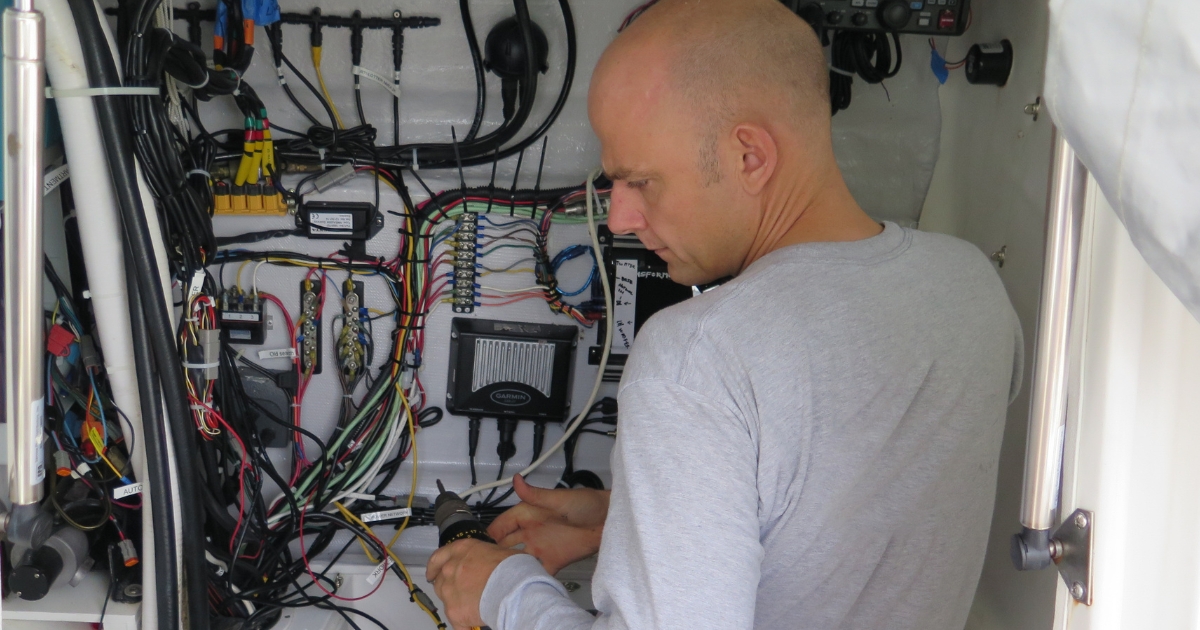
Which entry level qualifications will I need?
As for all crew working on board, to be a superyacht engineer you need to have completed your STCW basic safety training (a five day course) and have a valid ENG1 medical certificate. Assuming you follow the standard route into engineering, once you have both the STCW and ENG1, you will need to complete the AEC 1 and 2.
AEC 1 provides students with basic theoretical knowledge, as well as some practical hands-on experience of diesel engines/systems to enable you to meet the MCA’s requirements. This covers the basic operation of engines and their support systems, as well as checks and fault finding.
You can then progress to the AEC 2 course, which covers topics as diverse as refrigeration, legislation (books and records), maintenance systems and techniques, lifting and slinging, safe systems of work, electrical distribution, basic hydraulic systems, fresh water and sewage systems, and much more.
What are the different roles within the engineering pathway?
Although this varies depending on the needs of the individual vessel, the engineering roles on board a superyacht typically range from fourth engineer through to third, second, first and then chief engineer. The key difference between these positions is found in the level of leadership and management responsibility attributed to each role.
Fourth engineer As the most junior engineering officer on board, the fourth engineer is still learning the ropes, and you will need to demonstrate a willingness to learn and get stuck in straight away in order to succeed in this role. Chances are, you will be splitting your time between phases at sea and phases ashore to attend the courses necessary to progress in your career. Third engineer With responsibilities varying from yacht to yacht, the duties of a third engineer are diverse and could include the maintenance of lifeboats, tenders, toys, jet skis and deck equipment such as winches, davits, and hatchways, as well as interior maintenance. Second engineer Typically the deputy to the chief engineer, the 2nd engineer has responsibility for the maintenance of the engine room, often taking on more challenging repair and maintenance tasks, as well as supervising more junior crew members.
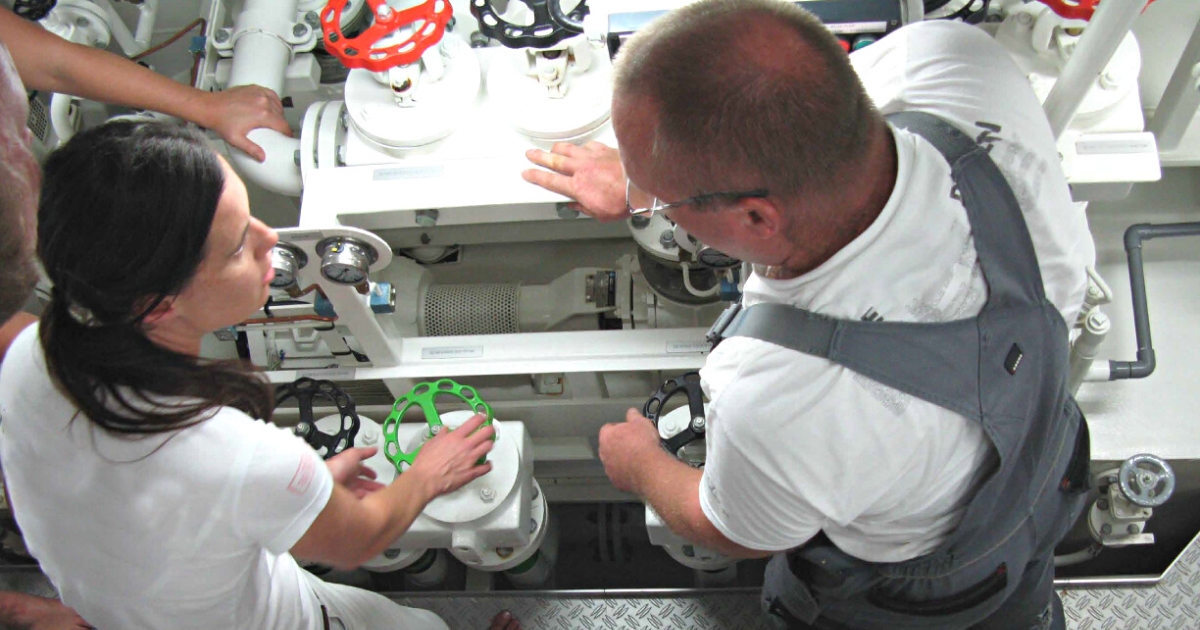
Chief engineer The chief engineer (often a sole engineer on smaller yachts), commands all engineering operations on board and will act as the senior advisor to the captain on all issues relating to the condition and serviceability of the engines, propulsion, ancillaries and interior systems.
Working closely with the captain to always ensure onboard safety, chief engineers are also responsible for maintaining compliance of the yacht’s systems and equipment with relevant laws and regulations to ensure that the vessel passes flag state and other surveys and inspections.
How do I rise up the ranks?
Progressing through the ranks requires you to apply for a certificate of competency (CoC) for each stage.
In order to qualify for the relevant CoC, there are various requirements for each role. These include attaining a certain amount of seagoing service, passing selected examinations (oral and written), and holding the applicable ancillary and safety course certificates. To discover the level of experience and exact qualifications required for each individual CoC, as well as other useful courses and qualifications to help you stand out from the crowd, visit the Academy by Ephemeris website and explore the engineering pathways .
A spokesperson from Academy by Ephemeris highlights: “The yachting industry is always in need of fantastic, tech savvy engineers. It is a fulfilling, challenging and stimulating career, and we are delighted to have helped scores of enthusiastic candidates to achieve their career goals by following the guidance laid out on our platform.”

Post your comment
You cannot post comments until you have logged in.
No one has commented on this page yet.
RSS feed for comments on this page | RSS feed for all comments
Search articles with keywords

Yacht Crew Jobs and Salary Info
Here is a guide to the types of jobs found on board yachts for both the Exterior and Interior departments. Get information on job descriptions, skills and experience required to be hired, as well as the expected salary for the position. From entry level yacht jobs (ie. deckhand or steward) to a career path in the yachting industry, understand how each crew member contributes to the efficient operation of a yacht.
Yacht Crew: Deck Department
Other Titles: Master; Second Master; Second Captain
Job Description: The Captain is responsible for the safety of the passengers, crew and the vessel. The Captain oversees the navigation of the vessel, legal and regulatory compliance, budgeting and accounting, vessel maintenance, training, hiring and disciplinary action. The Captain must also achieve the owner’s objectives and answer to the yacht owner for all decisions that are made. Depending on the size of the yacht and number of crew will determine how much the Captain delegates versus the tasks completed by the Captain. Some large yachts may have a Second Captain as second in command.
Experience and Skills Required: The Captain must have a wealth of maritime experience and training including excellent engineering knowledge and knowledge of all safety and environmental regulations. Typically a Captain has worked through the other officer ranks on a superyacht. A Captain on a vessel larger than 3,000 GRT, needs the STCW Master Unlimited licence along with all its necessary courses. Additional skills required include management and accounting skills.
Average Salary: $4,000 to $8,000 per month (Captain of a vessel 60 to 100 feet.) $7,000 to $15,000 per month (Captain of a vessel 100 to 160 feet.) $12,000+ per month (Captain of a vessel 160 feet and up.)
First Officer
Other Job Titles: Chief Officer, Chief Mate
Job Description: The First Officer assists the Captain with navigational planning, administrative duties, crew discipline and safety. The First Officer is responsible for the vessel’s navigation and sets the navigational watch schedule. The 1st Officer manages the Bosun and deckhands, overseeing the maintenance of deck equipment and inventory. The 1st Officer also supervises the water sports equipment (aka: toys). The 1st officer may also be the designated security, safety, or medical officer.
Experience and Skills Required: The First Officer must have qualifications and licences that conform to International Maritime Organization (IMO) and STCW. The standard requirement is Chief Mate (Yacht) 3,000 gt A-II/2 or higher with previous Officer of the Watch experience. Applicants of smaller yachts may have certificates such as RYA Yachtmaster Offshore or Yachtmaster Ocean. Additional certification such as Dive Master or Fishing Specialist, are also an asset.
Average Salary: $5,000 to $8,000 per month (120 feet to 180 feet.) $7,000 to $12,000+ per month (180+ feet)
2nd Officer
Other Titles: Officer of the Watch
Job Description: Yachts larger than 140 feet employ a Second Officer in addition to the First Officer. The 2nd Officer understudies the 1st Officer. He is a navigational watch keeper and assists the First Officer with administrative and safety duties. The 2nd Officer leads the deckhands in deck maintenance duties. The 2nd Officer may also be designated security, safety, or medical officer duties.
Experience and Skills Required: The Second Officer must have qualifications and licences that conform to International Maritime Organization (IMO) and STCW. The standard requirement is Officer of the Watch (Yacht) 3,000 gt A-II/1 or higher. Previous yacht experience is preferred. Additional certification such as Dive Master or Fishing Specialist, are also an asset.
Average Salary: $5,000 to $6,000 per month (140 feet to 180 feet.) $5,500 to $8,000+ per month (180+ feet.)
Other Titles: Lead Deckhand, Senior Deckhand
Job Description: Under the direction of the First Officer, the Bosun supervises the deckhands in the deck cleanliness and maintenance of the vessel. The Bosun develops, executes and assists in planned maintenance and repair of the exterior of the vessel. This includes painting, varnishing, repairing, caulking, and fibreglass repair. The Bosun monitors the condition of the ship’s fire and safety equipment and is responsible for maintenance of the toys and tenders. The Bosun is a watchkeeper, security officer, and tender driver when needed.
Experience and Skills Required: The Bosun should be in possession of the Yachtmaster Offshore (or higher) or the OOW certification which includes GMDSS. The Bosun should have knowledge of maintenance products and knowledge of all equipment onboard. The Bosun should have knowledge of the water sports equipment and some engineering knowledge. Minimum three years experience as a yacht deckhand is required. Additional certification is an advantage.
Average Salary: $3,000 to $4,500 per month (100 feet to 180 feet.) $4,000+ per month (180+ feet)
Other Titles: Junior Deckhand
Job Description: This entry level position is expected to undertake a variety of tasks. These include cleaning, polishing, waxing, painting, varnishing, sanding, fibreglass repair, carpentry, line handling, exterior maintenance, driving tenders (if qualified), setting up toys, diving (if qualified), helping clean cabins, helping prep meals, helping serve meals, and helping clean engines. On smaller vessels, there may be one deckhand versus larger yachts may have five or more deckhands supervised by a Bosun.
Experience and Skills Required: Although no previous yachting experience is required, general seafaring skills are expected. Deckhands should have basic knowledge in navigation, boat handling, engines and radio equipment. Additional skills such as painting, woodworking, fibreglass experience are an asset. Additional certifications such as diving qualifications and fishing skills, Tender Driving Licence, and the Radio Operators Certificate (ROC) are also beneficial.
Average Salary: $2,000 to $4,000 per month (60 feet to 120 feet.) $2,500 to $3,500 per month (120 feet to 180 feet.) $2,500 to $4,000+ per month (180+ feet)
Yacht Crew: Engine Department
Chief engineer.
Job Description: The Chief Engineer is responsible for the safe operation of engine room operations. The Chief is also responsible for the maintenance of the vessel’s engines, generators, hydraulics, outboard engines, electrical systems, plumbing, HVAC systems including refrigeration and air conditioning, fuel polishing, water makers, computers, entertainment systems and other interior equipment. The Chief Engineer plans and executes the vessel’s preventative maintenance. On a small yacht he may be the only engineer onboard, while larger yachts he may supervise a team of engineers to perform the maintenance.
Experience and Skills Required: The Chief Engineer must have extensive maritime experience and training including knowledge of all safety and environmental regulations. Depending on the size of yacht will determine the minimum qualifications required. At the very least, Chief Engineer Certificate of Competency (Y4) A-III/3 is limited to vessels less than 200gt and less than 1,500kw in size. The highest qualification for a Chief Engineer is the Chief Engineer Unlimited A-III/2.
Average Salary: $5,000 to $10,000 per month (120 feet to 180 feet.) $7,500 to $15,000+ per month (180+ feet)
2nd Engineer (Licensed)
Other Title: Junior Engineer Licensed, Second Unlimited, OOW Engineer (AEC)
Job Description: The 2nd Engineer assists the Chief Engineer in the safe operation of the engine room. The 2nd Engineer performs maintenance on the vessel’s engines, generators, hydraulics, electrical systems, plumbing, HVAC systems including refrigeration and air conditioning, fuel polishing, outboard engines, water makers, computers, and entertainment systems.
Experience and Skills Required: Depending on the qualifications will determine the engineer’s average salary. An Engineer with only the Assistant Engineer Unlimited A-III/1 (AEC) certificate makes less than an Engineer with a Chief Y3 Licence. In general, an engineer must possess expert knowledge of mechanical, electrical, electronic and other on board equipment.
Average Salary: Junior Engineer (Licensed with AEC) $3,000 to $4,500+ per month. 2nd Engineer (Chief Y2 to Y3) $6,000 to $8,000/m (160 feet to 190 feet.) 2nd Engineer (Chief Y2 to Y3) $7,000 to $9,000+ per month (190+ feet)
Junior Engineer (Unlicensed)
Other Title: Engine Crew; OOW Engineer
Job Description: As directed by the licensed 2nd Engineer, the unlicensed Junior Engineer performs tasks such as cleaning, painting and maintenance of the technical spaces, bilges and equipment. Other duties may include maintenance on the vessel’s engines, generators, hydraulics, electrical systems, plumbing, HVAC systems including refrigeration and air conditioning, fuel polishing, outboard engines, water makers, computers, and entertainment systems. Team player duties include line handling and water sports equipment.
Experience and Skills Required: An unlicensed Junior Engineer needs only the Yacht Rating Certificate. Alternatively, an OOW Engineer needs the Marine Engine Operator License (MEOL) to be qualified as an officer of the watch. A Junior Engineer or OOW Engineer needs knowledge of general systems on board (diesel, refrigeration, air conditioning, plumbing, electronics and outboards). Additional certification is an asset.
Average Salary: $3,000 to $4,500+ per month (160 feet to 300 feet)
Electronic Technical Officer (ETO)
Other Job Titles: Electronic Engineer; Electrical Engineer, Audio Visual and IT Engineer
Job Description: Electronic Technical Officers and Electricians are employed on larger yachts (160+ feet). The ETO reports to the Chief Engineer and is responsible for the maintenance of all electronics, computers, internet, televisions, entertainment systems, satellites, radios and communications equipment for efficient operation.
Experience and Skills Required: An ETO or electrician may have experience as an engineer on a yacht with a specialty in electrical and electronics. The STCW Engineering certification may be a requirement depending on the yacht. Land based experience in electrical, electronics, or IT server maintenance may also be acceptable.
Average Salary: $3,000 to $8,000+ per month (Depending on Experience and Qualifications)
Yacht Crew: Interior Department
Other Title: Interior Manager
Job Description: On yachts larger than 160 feet, a Purser is employed as the person responsible for the overall operations and guest relations of the interior department including housekeeping, bartending, table setting and silver service. The Purser oversees all interior purchasing, provisioning, human resources, and the accounting for the entire yacht. The Purser works with the Chef on menus and wine pairing. The Purser acts as a concierge for the guests with their knowledge of restaurants and activities in the yacht’s cruising area.
Experience and Skills Required: Requirements for a Purser include all the PYA GUEST Level 3 courses such as the Interior Yacht Management program. Typically, the Purser has previous yacht experience as a Chief Stewardess.
Average Salary: $6,000 to $9,000 per month (160 feet to 250+feet)
Chief Steward
Other Job Titles: Head of Housekeeping
Job Description: The Chief Steward is responsible for the overall cleanliness of the interior of the vessel. Duties include setting the schedules for guest service and cleaning, and supervising stewards in their duties. The Chief Steward organizes with Chef for guest meal service. The Chief Steward is also responsible for inventory and interior accounting. On smaller vessels the Chief Steward is in charge of interior operations, whereas larger vessels the Chief Steward reports to the Purser.
Experience and Skills Required: Requirements for a Chief Steward include all the PYA GUEST Level 3 courses such as the Interior Yacht Management program. Typically, the Chief Steward has extensive experience as a Steward. Other skills required are the ability to delegate, attention to detail and excellent communication skills.
Average Salary: $3,000 to $6,500 per month (100 feet to 140 feet.) $5,000 to $9,000 per month (140 feet to 200+ feet)
Job Description: Typically on yachts over 140 feet, a Butler is employed to make sure the guests are having all their needs met. The Butler is responsible for providing impeccable service to guests. The Butler may assist with party planning.
Experience and Skills Required: Previous experience as a butler is preferred as is yacht experience. Additional certification in the PYA GUEST courses is beneficial.
Average Salary: $5,000 to $8,000 per month (140 feet to 250+ feet)
Other Job Titles: 2nd Steward; Junior Steward; Laundry Steward; Solo Stew
Job Description: The Steward or Stewardess is responsible for cabin preparation, detailing interior, bartending, Silver Service (food and drink service) and laundry. More specifically this means cleaning and polishing bathrooms (heads) and bedrooms, bed-making, ironing and folding linens, table-setting, polishing cutlery, and flower arranging. As an entry level position, duties may also include deckhand tasks.
Experience and Skills Required: As an entry level position, there are no mandatory certificates needed (apart from the Basic STCW 95 course). Although, the more experience and training that a candidate has, the better chances of getting hired. Food and beverage experience and hotel experience are an asset. Any or all of the PYA G.U.E.S.T. introductory level courses are beneficial. Additional skills such as massage or beautician will also increase hiring opportunities.
Average Salary: $2,500 to $4,000 per month DOE (100 feet to 160 feet.) $2,500 to $5,500 per month DOE (160+ feet)
Other Titles: Executive Chef
Job Description: The Chef is responsible for all food prepared on the vessel. The Chef plans meals for an entire itinerary and prepares them with a high degree of presentation. The Chef is responsible for provisioning, ordering, purchasing (negotiating with worldwide suppliers) and storing food items. The Chef may work solo or alongside a Sous Chef, depending on the size of the vessel. The Chef must maintain immaculate cleanliness and hygiene in the galley and a Chef must be well organized. Smaller vessels may expect the Chef to participate in other duties, too.
Experience and Skills Required: Although smaller vessels may hire non-culinary trained persons for a position as a Chef, only culinary trained Chefs with years of experience can expect to land a Chef’s job on a megayacht. A Chef should have experience in worldwide provisioning and budgeting skills and should have nutritional and dietary knowledge. Previous yachting experience as a Sous Chef is preferred.
Average Salary: $4,500 to $8,000 per month (100 feet to 160 feet) $6,000 to $12,000 per month (160+ feet)
Other Title: Second Chef; Crew Chef; Stew-Chef; Stew-Cook; Cook
Job Description: On vessels larger than 140 feet, a Sous Chef is employed to assist the Chef with meal preparation and cooking for the crew. On smaller yachts a ‘Stew-Chef’ encompasses both the cooking and Steward’s duties.
Experience and Skills Required: Experience in a hotel or restaurant or previous yachting experience is preferred. Knowledge of food safety, storage, and nutrition is required. Although not mandatory, a Sous Chef should have a recognized qualification such as Level 3 Diploma in Professional Cookery.
Average Salary: $4,000 to $6,000+ per month (140+ feet) $3,000 to $5,000 per month (60 feet to 160 feet)
Related Articles:
Overview of the Yacht Industry
Life Aboard Yachts
Yacht Crew Training
We use cookies to ensure that we give you the best experience on our website.
- Brokerage New Construction How to Buy How to Sell
- Yacht Fleet Yacht Catalog Charter Marketing Destination Guides
- Financial Services Payroll & Accounting Payroll Service Process Logistical Support Admin Services Crew Admin
- Job Descriptions Crew FAQ
- About Sitemap

- Yacht Department Directory
- Engineering Department
2nd Unlimited
About the 2nd unlimited.
The second engineer onboard a yacht is keen to support and learn from the chief engineer on a mid-large size superyacht. This role requires knowledge of safety procedures, strong troubleshooting skills and knowledge of the wide variety of onboard systems. The cleanliness and maintenance of the engine room will also be a key part of this position. The appropriate license for the specific vessel is required and will most likely range from a MCA Y2 – Y4 level license with at least three years of experience and deck experience. Willingness to help the deck department when needed is necessary.

Job Responsibilities
- Safety in the engine room
- Cleanliness and maintenance in the engine room
- Increasing knowledge of all systems on board
- Continued education and licensing
Required Skills
- Knowledge of general systems onboard: diesel, refrigeration, air conditioning, plumbing, electronics and outboards
- Team player, able to assist with some deck duties; line handling, water sports
- Flexible and adaptable
- Excellent planning for preventative maintenance
- Ability to prioritize and organize
- Multitasking
Salary Modifiers
- Commercial experience
- Specialized certification (i.e. MTU)
- Outboard engine certification/experience
- Dependability
Position Statistics
Career path, chief engineer unlimited, chief y1 (<3000gt < 9000kw), chief y2 (<3000gt < 3000kw), chief y3 (<500gt < 3000kw), chief y4 (<200gt < 1500kw), 2nd (<3000gt <6000kw), 2nd (<3000gt <3000kw), 2nd (<500gt <3000kw), oow engineer (meol), oow engineer (aec), electronics engineer (eto), junior engineer (unlicensed).
Second Engineer: Vital Insights into Salary & Responsibilities
06 July 2023
Introduction to the Role of a Second Engineer
The maritime industry is a complex, dynamic field that thrives on the collective efforts of a range of specialists. One such key role is the Second Engineer , an integral part of the vessel's operational backbone. The Second Engineer, also referred to as the first assistant engineer, holds a pivotal position in the engine room hierarchy on a ship, responsible for everything from maintenance of the main propulsion engines to the overall administration of the engine room crew. Their role combines technical expertise, leadership, and stringent adherence to maritime regulations, making it one of the most demanding, yet rewarding, roles in the marine industry.
The Journey: Becoming a Second Engineer
So, how does one become a Second Engineer in the maritime industry? A key requirement for this role is acquiring the Second Engineer's Certificate of Competency (CoC), which in itself demands a minimum of a year of sea time as an Engineer Officer of the Watch. However, in practice, many aspirants accumulate around three years of sea time before they are ready to tackle the challenges of a Second Engineer. This period helps nurture necessary practical skills and an understanding of the sea's unpredictable nature, preparing them for their future responsibilities.
The journey to becoming a Second Engineer usually begins with a promotion from the position of Third Engineer after successfully passing the necessary written and oral examinations for the Second Engineer's CoC. At this point, a pathway to professional development opens up, including the opportunity to ascend to the position of Chief Engineer on cargo ships. For those serving on larger vessels like cruise ships, the next step might be as a First Engineer.
Having substantial seagoing experience typically qualifies a Second Engineer for a shore-based role as a superintendent engineer. However, many choose to obtain their Chief Engineer's license before venturing into this arena. This transition not only signifies a professional milestone but also introduces new responsibilities and challenges that require an even higher level of competency and commitment.
Responsibilities & Tasks of a Second Engineer
The Second Engineer’s role encapsulates a broad array of tasks, combining hands-on technical work in the engine room with a significant amount of administrative duties. They serve as the general manager of the engine room, and one of their primary responsibilities includes scheduling all the maintenance jobs according to the ship's planned maintenance system. This involves liaising with the Chief Engineer for essential operations like the ordering of bunkers, lube oils, spare parts, and stores. In addition, they provide daily reports to the Chief Engineer, ensuring that all operations run smoothly and within regulations.
At sea or in port, the Second Engineer oversees major maintenance work, usually leading the operations with the support of one or two assistants. Their domain extends beyond the main engines to all the ship’s equipment, including life-saving and firefighting apparatus. This diverse scope of responsibilities positions the Second Engineer as the first line of response in case of emergencies, making their role critical to the ship's overall safety and efficiency.
However, the Second Engineer's role isn't confined to the engine room. A significant part of their workday is dedicated to paperwork and management duties. This includes leading daily toolbox meetings in the mornings, arranging the jobs of the engine crew, managing work permits, and supervising the other engineers, oilers, fitter, and potentially the electrician. This all-encompassing responsibility requires them to be efficient multitaskers, with the ability to manage time and resources effectively.
Leadership & Team Management
As a senior engineering position, the Second Engineer commands significant respect and responsibility on the ship. They typically manage a team of 6-9 people, requiring them to possess robust leadership skills. Managing the engine crew and other staff is a delicate balancing act, requiring a deep understanding of human nature and a knack for ensuring the smooth running of the ship’s operations. The Second Engineer's role is often deemed the most challenging on the ship, especially in terms of workload. However, it also provides them with the unique opportunity to make a tangible impact on the ship's overall functioning and safety.
Whether it’s arranging work schedules, handling emergencies, or conducting maintenance, the Second Engineer needs to lead from the front, drawing upon their experience and knowledge. This leadership role extends to their interactions with the Chief Engineer, to whom they report regularly, ensuring the engine department is aligned with the broader ship operations.
The successful management of such a diverse array of responsibilities marks a significant achievement in a Second Engineer's career, positioning them well for future advancement within the maritime industry. Yet, as they climb the ladder, they must continually adapt to new technologies and challenges that this evolving industry presents.
Staying Current: Impact of Technology & Continuous Learning
The maritime industry has seen significant technological advancements over the past few years. The role of the Second Engineer has evolved in step, requiring a commitment to continuous learning and adaptation. Today, a Second Engineer must stay up to date with emerging equipment and technologies onboard newer ships, such as Ballast Water Treatment Systems (BWTS), Scrubbers, and Nitrogen Oxide (NOx) reduction systems.
However, staying current with technological advancements doesn't mean abandoning traditional technical skills. Often, the Second Engineer may still need to perform manual labor and old-school technical work, such as operating a lathe and welding, especially if the ship lacks a dedicated fitter/welder.
Staying updated and embracing new technology not only enhances the Second Engineer's competency onboard but also opens doors to opportunities ashore. With their diverse experience and adaptability, they may be poised for a future role as a technical superintendent engineer. For a detailed look into the digitisation of the maritime industry, check out our guide on Navigating the Digitalised Maritime Industry .
Responsibility: Emergency Preparedness & Critical Systems
The Second Engineer's role goes beyond day-to-day operations. Their responsibilities include managing emergencies and ensuring that critical systems function smoothly. In the event of emergencies like fire, grounding, collision, or the need to abandon ship, the Second Engineer often assumes a leadership role.
Specific duties of a Second Engineer during emergencies usually include preparing emergency power, activating emergency sea water supply (fire line), and operating foam or CO2 fire extinguishing systems. Their critical role in these scenarios is a testament to the trust and responsibility placed on them. To learn more about ship safety and preparedness, explore our article on Navigating Maritime Emergencies: Ship Safety & Preparedness .
The efficacy of a Second Engineer in handling workload stress, emergencies, and daily tasks often sets the stage for the overall operations of the ship. By respecting basic engineering and management principles and acknowledging the hard work of the team, a Second Engineer can effectively maintain the balance on board.
Compliance: Maritime Regulations & Environmental Impact
Adherence to maritime regulations and international laws is a crucial aspect of the Second Engineer's role. One such critical responsibility is the operation of the Oily Water Separator. This device separates oil from water that drains from the engine room bilges, a form of waste known as bilgewater. Any malfunction in this system can have serious consequences. If the bilges cannot be discharged efficiently without breaching the 15ppm oil discharge limit, the ship may need to halt operations and discharge to a slop barge, which incurs significant costs for the shipping company.
Historically, some Second Engineers manipulated separators to bypass these issues, but modern oily bilge separators are hard to trick. Moreover, the repercussions of such practices can be severe, including potential jail time. Therefore, it is unlikely that modern Second Engineers would risk such consequences. Rather, they are more likely to prioritise complying with regulations to ensure the safety and environmental sustainability of their operations.
This responsibility, while necessary, can induce significant stress on the Second Engineer. Nevertheless, their dedication to upholding maritime regulations underscores their commitment to the ship's safe and legal operations and their important role in preserving the marine ecosystem.
Job Market Insights: Demand for Second Engineers
In the commercial shipping industry, the role of the Second Engineer is one of the most in-demand. There is a noticeable discrepancy between the availability of deck officers and engine officers, making Second Engineers highly sought after.
Passing the rigorous exams to obtain the Certificate of Competency (CoC) for a Second Engineer is a challenge few manage to conquer. Many of those who succeed aim to become a Chief Engineer, therefore reducing their availability for the position of Second Engineer. This considerable shortage has led to increased salaries for Second Engineers, often approaching that of a Chief Engineer in many companies.
However, the demand for Second Engineers is not uniform across all vessel types and maritime industries, which brings us to the next section.
Salary Breakdown: Understanding the Compensation Structure
The average salary for a Second Engineer can range from 8000 to 12000 USD, with potential for additional earnings based on the complexity of the work undertaken. As a senior engineer, a Second Engineer may be eligible for several financial incentives including rejoin bonuses, seniority bonuses, and others.
It's important to note that the compensation structure can vary significantly based on the type of ship, the company, and the specific responsibilities. For a comprehensive breakdown of seafarer salaries across industry, rank, and ship type, take a look at our guide on Seafarer Salaries .
Work-Life Balance & Challenges in Different Vessel Types
The position of a Second Engineer is demanding, with the workload often exceeding that of other positions on board. Therefore, achieving a good work-life balance can be challenging.
Most contracts offer a schedule of 3 months on and 3 months off, although some companies may require longer on-ship durations. However, due to the current job market, many companies are reducing the minimum contracts to 3 months to attract new talent. Despite the high workload, opportunities for shore leave are rare on most cargo vessels, particularly tankers.
The nature of work for a Second Engineer can also vary significantly based on the type of ship. For instance:
- On bulk carriers, the workload is typically simpler and lighter.
- Tankers usually require more intensive work due to a larger machinery base and stricter standards, leading to additional paperwork.
- Gas tankers present the most challenging work environment but often have more personnel to help manage the workload.
- On container vessels, the workload can be demanding due to larger engines, leading to frequent maintenance work at port.
- On cruise liners and yachts, the role of a Second Engineer can range from managing work without much manual labor on large cruise ships to being the least senior engineer on board a yacht with diverse responsibilities, from engine overhauls to toilet unclogging.
These differences highlight the need for adaptability and resilience, characteristics that are integral to the Second Engineer's role.
The Path Forward: From Second Engineer to Chief Engineer or Superintendent
The career path of a Second Engineer doesn't stop at their current rank. With experience and further certification, they can aspire to become a Chief Engineer, taking over the ultimate responsibility for the entire engine department.
On larger vessels such as cruise ships, the next step might be becoming a First Engineer. Furthermore, after amassing significant sea-going experience, a Second Engineer could also transition to a shore-based role, such as a Superintendent Engineer. However, many choose to obtain their Chief Engineer's license before making this transition.
Professional development opportunities abound in the maritime industry. The key is in constant learning and adapting to new technologies and methodologies.
How Liveseas Supports Second Engineers in their Maritime Careers
Liveseas plays a pivotal role in supporting all ranks in their maritime careers. The platform connects professionals with companies of their choice, serving as a comprehensive resource for everything related to careers at sea.
At Liveseas , you can showcase your skills, gain visibility with potential employers, and connect with opportunities that match your career aspirations. Liveseas is a seafarer-first platform, ensuring that your needs and career goals are always our priority.
Whether a Second Engineer is seeking work, or looking to pivot to a better company, Liveseas is there to assist.
The role of a Second Engineer in the maritime industry is demanding yet rewarding. It calls for exceptional leadership capabilities, technical skills, and adaptability. With the constant emergence of new technologies, the position requires continuous learning and development.
However, it is a role that offers plentiful opportunities for growth and progression. Not only is the position financially rewarding, but it also allows for professional development, opening doors to more senior roles both at sea and ashore.
At Liveseas , we understand the challenges and rewards of a maritime career. We are here to help Second Engineers, and all other seafaring professionals, navigate their career paths successfully and make the most of the opportunities that come their way.
- ©2024 Liveseas
- All rights reserved.

Get Onboard
Superyacht Training
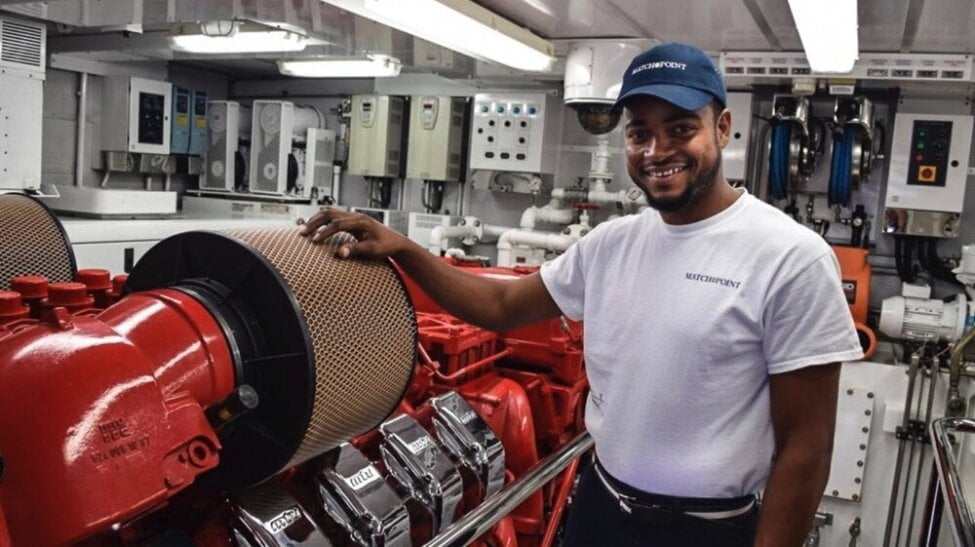
How To Become A Superyacht Engineer
Thinking about pursuing a career as a superyacht engineer we show you how….
We frequently receive emails from students asking us, “How do I become a Superyacht Engineer?” “Are my trade skills transferable?” “What yacht training must I complete?” and “ What qualifi cations do I need? “. In this article, we break down these questions and explain exactly what steps you need to follow in order to become a super yacht engineer.
What is a Superyacht Engineer?
The crucial part of any yacht engineer job description is maintaining the mechanical and electrical operations of the yacht. The duties of an engineer range from maintaining and servicing generators, jet skis and powerboats to replacing oil filters, repairing water makers, monitoring air conditioning, AV, IT and even unblocking toilets. Whether you are new to the industry, or have worked on land as a plumber, carpenter or tradesman, anyone can become a super yacht engineer, provided they have completed the necessary courses.
The Engineering Department onboard a super yacht is quickly becoming one of the most desirable departments to work due to the rotation packages as well as the transferable skills land-based skills such as plumbing and carpentry . Senior Engineers are highly respected and are of a similar rank to the Captain as the yacht is unable to manoeuvre without them.
What are the Superyacht Engineering Courses and Qualifications?
Yacht engineering qualifications were introduced in February 2001 to provide an industry standard system of certification. The system allows all those who wish to pursue engineering careers to do so, no matter what their previous training is.
The Maritime and Coastguard Agency (MCA), have set out the basic course progression you will need to follow in order to work your way up from a Junior Engineer, to Chief Engineer onboard. This involves completing the AEC , MEOL and Yacht 4, 3, 2 and 1 qualifications.
The qualifications you require include:
A mechanical, diesel or electrical background
Strong project management skills
Inventory maintenance experience
Understanding of different softwares
The Approved Engine Course (AEC) – the base minimum for superyacht engineers who wish to work on yachts over 24m LOA
The Marine Engine Operators Licence (MEOL)
Depending on the size of yacht you want to work on, you may need the following licenses.
– Yachts <200GT with up to 1500Kw in propulsive power:
Small Vessel Second Engineer (formerly Y4)
– Yachts <500GT with up to 3000Kw in propulsive power:
Small Vessel Chief Engineer (formerly Y3)
– Yachts <3000GT with up to 9000Kw in propulsive power:
Small Vessel Chief Engineer (formerly Y1/2)
or Officer of the Watch (Engineering) – usually gained from the commercial shipping industry
– Unlimited license:
Engineer Officer of the Watch – Unlimited
What is a typical yacht engineer salary?
Starting out as a 3rd or junior engineer, you can expect to earn anywhere from $3,000 to $6,500 per month, and as you move up the ranks to 2nd engineer this increases from $5,000 to $8,000.
In the top position, a chief yacht engineer salary can be anywhere between $8,500 to $13,500, depending on the size of the yacht, so if you want the big bucks then the engineering department is the way forward!
There is no average yacht engineer salary, with roles varying so much from yacht to yacht, however these figures are a guideline for what you can expect to earn. It is worth noting that obtaining your engineering qualifications takes time and is an expensive process, so be sure you are ready to commit to long hours of studying ahead. Check out our article on yachting salaries for more information.
What are the super yacht training package do you offer?
Once you have completed your STCW course and other basic safety training, you can look to expand your skill set to work on board in the super yacht industry.
We have put together an extensive Superyacht Engineering training program which is an ideal entry level introduction for those seeking to work on a yacht as an Engineer. Due to the longevity of the engineering department onboard, this is an excellent avenue to explore if you are looking for real career progression, rather than a gap year experience.
- Proficiency in Designated Security Duties (PDSD)
- RYA Powerboat Level 2
MCA Approved Engine Course (AEC1)
Interested in learning more?
If you are thinking about starting out as an engineer, you can read more about our Superyacht Engineer Course package.
You can complete these courses with us at Get Onboard Superyacht Academy in Cape Town. If you are interested in learning more, why not speak to one of our expert consultants who will happily answer any additional questions you may have.
Needing more?
Error: Contact form not found.
RYA/MCA Online
1. what are the basic requirements you need to be eligible to work in the yachting industry, 2. what is the stcw and why do i need it, 3. what is the eng1 medical certificate, 4. what land based experience will help me find a super yacht job, 5. what are the different departments onboard, 6. what crew training is required for me to work as a junior deckhand.
- Yachtmaster/Coastal Skipper Theory
- Yachtmaster/Coastal Practical
- Specialist Super Yacht Training Course (Deck Hand Training Course)
- RYA Power Boat Level II
- RYA Personal Watercraft Course
- RYA Competent Crew Certificate
- RYA Day Skipper Theory and Practical Certificates
- VHF Radio Operator’s License
7. What crew training is required for me to work as a junior stewardess?
- Stewardess Course
- MCA Food Safety Level 2
8. How do I book my training courses?
9. how do i get my first job on a yacht, 10. are these courses worth it, or am i just wasting my money, 11. will i get hired for my first job from south africa, 12. what is daywork, 13. what are the best locations to get a yacht job, 14. how much can a motor yacht stewardess or deckhand earn, 15. what are the negatives of working on a yacht, 16. what are the positives of working on a yacht, 17. is working on a super yacht for everyone, 18. what is the minimum age to work on a yacht, 19. is accommodation provided when i am completing my yacht training in cape town.
Build a Career You'll Love
Yacht engineer salary in the united states.
How much does a Yacht Engineer make in the United States? The salary range for a Yacht Engineer job is from $76,062 to $103,414 per year in the United States. Click on the filter to check out Yacht Engineer job salaries by hourly, weekly, biweekly, semimonthly, monthly, and yearly.
- Per semimonth
- Connecticut
- District of Columbia
- Massachusetts
- Mississippi
- North Carolina
- North Dakota
- New Hampshire
- Pennsylvania
- Rhode Island
- South Carolina
- South Dakota
- West Virginia
- San Francisco, CA
- Washington, DC
- Chicago, IL
- New York, NY
HOW SHOULD YOU USE THIS DATA?
Employees: Use this as a guide for salary expectations, but be aware that responsibilities can change across companies for the same job title, so there may be differences between this data, other free site and our subscription products bought by employers.
Employers: This data could be used as reference point in your market pricing, but not the only source, due to differences across jobs locations, and sizes of companies.Consider additional sources like our Employer reported data.
Our consulting team crafts efficient, data-driven solutions using the power of CompAnalyst ® , ensuring your challenges are met head-on.
The trusted data and intuitive software your organization needs to get pay right.
Let our management tool - JobArchitect™ streamline your job description process. Say goodbye to the hassle of crafting job descriptions.
Highest Paying Cities for Yacht Engineer in the United States
States with higher salaries for yacht engineer, how much do similar professions get paid in the united states, how much should you be earning, what does a yacht engineer do.
According to the Safety of Life at Sea (SOLAS) convention, it is the responsibility of the Yachts Chief Engineer to look after the safety of maritime professionals and other Engineers working in the engine room.
Holding an AEC certificate will allow you to be a chief engineer on a yacht over 24m and less than 200 Gross Tons or act as an assistant engineer on vessels over 200 GT up to 60NM from a safe haven.
The main role of a Yacht Engineer is mainly responsible for the safe and efficient running of the yacht.
These options may not offer you huge shortcuts when you start working towards becoming a yacht engineer, but they will provide you a knowledge base that is extremely beneficial as you advance.
On some yachts, there may also be a duel-deck engineer to help out with the deck and engineering jobs, and apprentices can even be hired in some instances.
View Job Skills and Competency Data for more than 15,000 Job Titles, 18 Industries, and 26 Job Families.
Most Common Benefits for Yacht Engineer
Related companies for yacht engineer in the united states, frequently asked questions, do i receive fair pay as a yacht engineer currently, what are the responsibilities of a yacht engineer, how much do similar jobs to yacht engineer make.
- Yacht Captain
- Yacht Manager
- Yacht Designer
- Yacht Broker
- Yacht Sales
Where can I get a higher Yacht Engineer salary in the United States?
What is the yacht engineer's salary range in the united states, career insights.

Rotation 2nd Engineer Salary (45m - 60m)
€ 6,000 / month.
Average Base Salary
Based on 52 respondents
€ 6,500 / year
(Range: € 0 - € 65,000 / year )
Average Bonus + Tips
How much does a Rotation 2nd Engineer make on a 45m - 60m yacht?
When it comes to the salary of a Rotation 2nd Engineer on a 45m - 60m yacht, there are many factors to consider. According to data from 52 anonymous respondents, the average monthly salary is €6,000 per month, with a range of €4,000 to €11,000 per month.
However, it's essential to note that several variables affect the 2nd Engineer's salary. These variables include their experience, qualifications, and longevity onboard, as well as the type of yacht (private or charter) and the generosity of the owner.
Additionally, 2nd Engineers on yachts can receive bonuses and tips, with an average of €6,500 per year. The amount of these bonuses and tips can vary widely, from €0 to €65,000 per year, depending on several factors such as individual performance and the yacht's success.
Therefore, while the average monthly salary for a Rotation 2nd Engineer on a 45m - 60m yacht is €6,000, the actual salary offered can vary significantly depending on the factors mentioned above. It's essential to consider all of these factors when negotiating salary and compensation for this position.
Additional Information
Below we have data on the most common rotation lengths of a rotational 2nd Engineer on a 45m - 60m yacht, as well as information on cabin arrangements, types of flights offered, training budgets, and also a comparison of how many 2nd Engineer's are Full Time vs. Rotational in the 45m - 60m yacht bracket.
Rotation Lengths
1 month on/ 1 month off
2 months on/ 2 months off
10 weeks on/ 10 weeks off
12 weeks on/ 12 weeks off
4 months on/ 2 months off
3 months on/ 1 month off
5 months on/ 1 months off
Shared Cabin
Private Cabin
Business Class (All Included)
Economy Class (All Included)
Economy Class (Some Flights Included)
Training & Courses
Significant budget for training & courses
Some budget for training & courses
No training or courses included
Full Time vs. Rotation
Copy and share this link with friends and colleagues so they can add their salary too!
https://yachtcareerhub.com/salary/2nd-engineer/rotation/45m-60m
- Engineering
2nd Engineer
Best Match Date Added (Latest First) Start Date Salary (High to Low)
Please select the options to filter jobs & positions
Job Type Any Permanent Position Rotational Contract Seasonal Temporary Daywork Cruising Delivery Mile Building Ocean Sailing Sail Racing
Department Any Accounting & Finance Administration & Clerical Build & Refit Creative & Marketing Crew Placement & Services Crew Training Deck Directors Engineering Galley Interior IT & Operations Specialist Yacht Management Yacht Sales & Charter
Position Any Fleet Captain Build Captain Captain Chase Boat Captain Relief Captain Chief Officer/1st Mate Deckhand/Mate 2nd Officer 3rd Officer Bosun Lead Deckhand Deckhand Deckhand/Security Junior Deckhand Deck/Steward(ess) Deck/Engineer Deck/Carpenter Deck/Divemaster Competent Crew Delivery Crew Dayworker Race Crew (Professional) Race Crew (Amateur) Chief Engineer Relief Chief Engineer Sole Engineer 2nd Engineer 3rd Engineer Chief ETO (CETO) Electrical Technical Officer (ETO) Electro-Technical Rating (ETR) AV/IT Officer Storekeeper Engineer Motorman Wiper/ Oiler Tender Engineer Junior Engineer Executive/Head Chef Sole Chef Sous/2nd Chef Chef de Partie/3rd Chef Commis/4th Chef Cook/Crew Chef Cook/Steward(ess) Purser Concierge Household/ Estate Manager Chief Steward(ess) Interior Manager Head of Service Head of Housekeeping Spa Manager Spa Therapist/ Steward(ess) Butler Sole Steward(ess) 2nd Steward(ess) 3rd Steward(ess) Steward(ess) Service Steward(ess) Sommelier Housekeeping Steward(ess) Laundry Steward(ess) Junior Steward(ess) Stew/Masseur(euse) Host(ess) Private Security Officer (PSO) Close Protection Officer (CPO) Private Driver/ Chauffeur Helicopter Pilot Helicopter Mechanic Hairdresser/ Barber Beautician Masseur(euse) Governor/ Governess Nanny Au Pair Tutor Florist Personal Assistant (PA) Executive Assistant (EA) AV/IT Specialist Videographer Personal Trainer (PT) Yoga/Pilates Instructor Sub-Pilot Dive Instructor Watersports Instructor Doctor Nurse Paramedic Chairman Chief Executive Officer (CEO) Group Financial Controller (GFC) Chief Financial Officer (CFO) Managing Director Director Financial Director Technical Director Training Director Yacht Management Director Charter Management Director Yacht Charter Director Yacht Sales Director Operational Director Company Secretary Fleet Protocol Director Maritime Compliance Director Creative & Marketing Director Yacht Sales Broker Yacht Charter Broker Charter Manager Charter Accounts Manager Charter Accounts Support Yacht Market Analyst Sales & Product Marketing Manager Sales & Product Marketing Assistant Sales Manager Senior Sales Executive Sales Executive Head of Yacht Management Yacht Manager Operational Manager Client Relations Manager Insurance Manager Insurance Consultant System Development Crew Compliance Manager Yacht & Crew Compliance Crew Compliance Administrator Crew Compliance Support Crew Services Administrator Head of Maritime Compliance & DPA Marine Superintendent Maritime Compliance & DPA Maritime Solicitor Marina Manager Marina Operative DPA & Safety Manager Yacht Compliance Manager Yacht Compliance Administrator Yacht Compliance Support Head of Yacht Accounts Lead Yacht Accounts Yacht Accounts Manager Yacht Accounts Administrator Yacht Accounts Support Fleet Technical Manager Project Manager Project Engineer Project Coordination Project Controller Supply Chain Manager Environmental Manager Supervisor/ Foreman Naval Architect Mechanical Engineer Marine Engineer Marine Electrical Engineer Marine Technician 3D CAD Technician/ Modeller Concept Designer (creative) Detail Designer Design & Proposal Engineer Design Engineer Senior Interior Designer Structural Engineer Interior Designer Cost Estimator Technical Superintendent Technical Manager Technical Controller Technical Assistant Technical Financial Controller Procurement Manager Procurement Assistant Head of Technical Compliance & DPA Logistics Project Manager Materials Controller Yacht/ Boat Builder Marine Joiner/ Carpenter Mechanical Fitter Marine Electrician Marine Plumber/ Pipefitter Marine Surveyor Sprayer/ Painter Laminator/ Finisher Assembler/ Fabricator Slinger (crane & lifting operative) Sail/ Cover Maker Upholsterer Seamstress Welder/ Plater Shipyard/ Warehouse Operative CNC Operative Corporate Development Manager Marketing Manager Marketing Executive Marketing Assistant Yacht Marketing Graphic Designer Content Writer Creative & Events Digital Marketer & SEO Partnerships Liaison PR & Communications Officer Head of Client Relations Head of Information Technology (IT) Business Development Manager IT Support Technician Web Designer/ Developer Crew Manager Recruitment Consultant Crew Assistant Crew Employment and Payroll Manager Crew Employment and Payroll Administrator Training & Exam Coordinator Training Coordinator Head of Safety Training Instructor Company Secretary Office Manager Listings Manager Administrator Customer Service Office Support/ Assistant Personal Assistant (PA) Executive Assistant (EA) Human Resources Manager Human Resources Administration Human Resources Support Group Finance Controller Assistant Group Finance Controller Finance Manager Financial Administrator Financial Analyst Accountant/ Book-keeping Accounts Administration
Team / Couple Don't mind Yes No
Vessel / Shore Based Type Any Chase Boat Commercial Vessel Expedition Vessel Fishing Vessel Motor Yacht Research Vessel Sailing Yacht Shore Based Position
Vessel Size Any 0 - 30m 31 - 39m 40 - 49m 50 - 74m 75 - 94m 95m+
Salary (e.g. £, $, €) Any 0 - 1,500 1,501 - 3,000 3,001 - 5,000 5,001 - 10,000 10,001 - 15,000 15,000+ per month per day
Location Any Antigua & Barbuda Australia France Greece Italy Monaco Seychelles Singapore Spain United Arab Emirates United Kingdom United States Virgin Islands (British) Virgin Islands (U.S.) Antarctica Bahamas Bermuda Canada China Costa Rica Cote d'Ivoire Croatia Cyprus Egypt French Polynesia Germany Guadeloupe Hong Kong Indonesia Maldives Malta Mexico Montenegro Netherlands New Zealand Norway Oman Poland Puerto Rico Qatar Russian Federation Saint Kitts and Nevis Saint Vincent and the Grenadines Saudi Arabia Sint Maarten Slovakia (Slovak Republic) South Africa Switzerland Thailand Turkey
Keyword Search
Clear all filters

- 56 positions

We are Wilson Halligan
The leaders in superyacht recruitment
2nd Engineer New

- Job ID #2262663
- 60m (197ft) Motor Yacht
- Starting 22nd Apr 2024
- United States
- EUR (€)250.00 Per Day
- Posted Today

- Job ID #2262407
- 80m (262ft) Motor Yacht
- Starting 30th Apr 2024
- EUR (€)7,500.00 Per Month

- Job ID #2229145
- 62m (203ft) Motor Yacht
- Starting 1st Mar 2024

- Job ID #2261605
- Starting 31st Mar 2024
- Posted Yesterday
- Job ID #2222739
- 45m (148ft) Motor Yacht
- Starting 30th Mar 2024
- USD ($)250.00 Per Day

- Job ID #2259908
- 70m (230ft) Motor Yacht
- Starting 1st Apr 2024
- EUR (€)5,000.00 Per Month
- Posted 20th Mar 2024
- Job ID #2259783
- Starting 25th Mar 2024
- Netherlands
- Job ID #2243206
- Starting 8th Apr 2024
- EUR (€)5,500.00 Per Month

- Job ID #2259273
- 90m (295ft) Motor Yacht
- Starting 19th Mar 2024
- EUR (€)7,000.00 Per Month
- Posted 19th Mar 2024

- Job ID #2258973
- Starting 5th Apr 2024

- Job ID #2258485
- 75m (246ft) Motor Yacht

- Job ID #2258394
- 50m (164ft) Motor Yacht
- Job ID #2258012
- 55m (180ft) Motor Yacht
- Starting 21st Mar 2024
- USD ($)8,000.00 Per Month
- Posted 18th Mar 2024
- Job ID #2257966
- 61m (200ft) Motor Yacht
- USD ($)6,000.00 Per Month

- Job ID #2257612
- JMS are looking for: 2nd Engineer 70mtr + March start date Worldwi...
Page 1 of 4
The 2nd Engineer works very closely with the Chief engineer and assists the Chief with the required tasks to ensure smooth running of engine room operations. The 2nd Engineer will teach skills to the 3rd/junior engineers and will execute planned maintenance. The 2nd engineer will be technically minded and have good working knowledge of all on board systems, troubleshooting and repair as well as have valuable knowledge on any safety aspects of the vessel.
Salary range
EUR 4000 to EUR 9000+ Per Month
Qualifications, training and skills required
- Qualification depending on vessel requirements and size Y4 up to Y2
- Advanced knowledge of on board systems
- Excellent technical and trouble shooting experience
- Servicing and maintenance
- Safety aspects
- Ability to prioritize
- Ability to train and show leadership skills
- Adaptable personality
- Good leadership skills
- Well presented
Extra desired training
- Shipyard experience
- Foreign language skills
Second Engineer for Yacht with salary 5000 USD
D&D is a truly client-oriented agency; each Client’s request is dealt with required individual attention and immediate involvement of our key personnel. With unique expertise in maritime personnel, we really know how to manage crewing requests successfully.
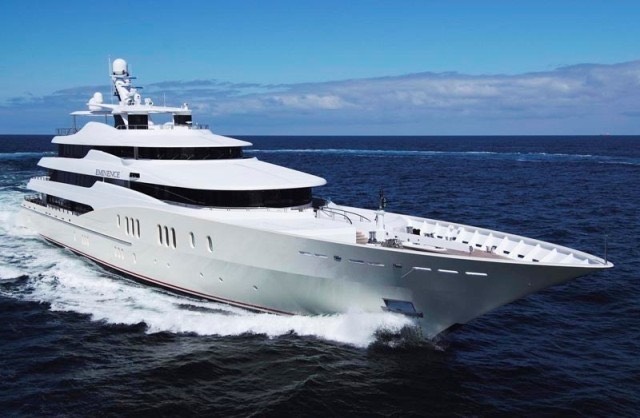
- Position: Second Engineer
- Ship Type: Yacht
- Salary: 5000 USD p/m
- Contract Duration: 12 months
- Requirement: Good English, CE license is needed for superyacht
Please send your CV to:
Similar Vacancies
- 4th ENGINEERS
- URGENTLY! Second Engineer For AHTSS
- SECOND ENGINEERS
Job added by DanD Crewing Services
About DanD Crewing Services
D&D is a truly client-oriented agency; each Client’s request is dealt with required individual attention and immediate involvement of our key personnel.
Other jobs at DanD Crewing Services
- Crane Operator for Bulk Carrier with salary 1800 USD
- Chief Engineer for Crude Oil Tanker with salary 12000 USD
- Chief Engineer for Bulk Carrier with salary 4300 EUR
Employment on all types of vessels
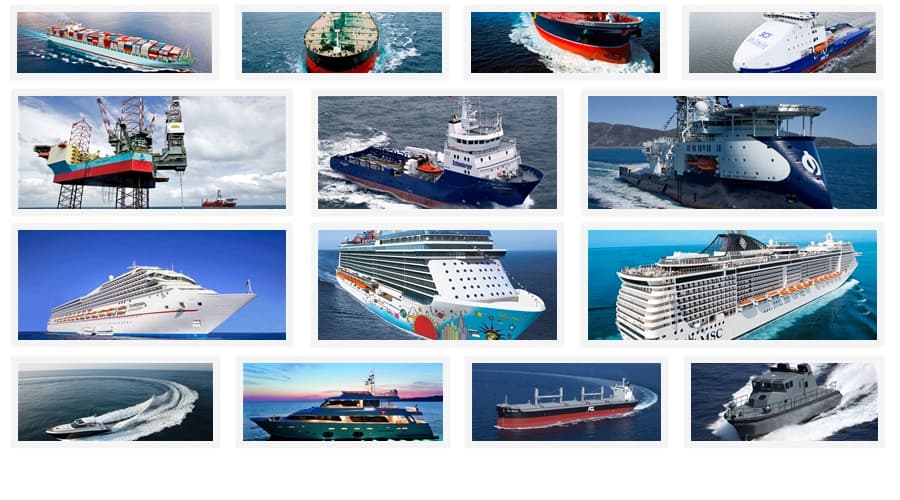
Similar Jobs
Recommended seafarers.
Indonesia - 3rd Officer
India - Electrical Eng.
Russia - Chief Officer
Ukraine - Catering Manager / Camp Boss
Brazil - 3rd Officer
Malaysia - Crane Operator
United States Of America - Cook Assistant
Ukraine - 2nd Officer
Indonesia - Chief Officer
Colombia - 1st Officer

IMAGES
COMMENTS
Above 50m, the Chief Engineer contracts are generally Rotational. The breakdown of their salary per month is below: On yachts above 50m, crew may be offered Permanent Second Engineer or Rotational Second Engineers contracts. The average monthly salary for yachts from 50-90m for Permanent Second Engineers is as follows:
SECOND ENGINEER SIZE OF VESSEL SALARY RANGE JOB DESCRIPTION & REQUIREMENTS: Second Engineer 190ft - 400ft+ $5,500 - $12,000 5 + years' experience / Minimum of an MCA Y2 - Y3 ... Engineer (ETO) All yachts $3,250 - $9,500 Entry level - 10+ years' experience / The ETO is a
Salary Range: $6,000 to $15,000. 2nd Engineer. The second engineer is also a highly skilled position requiring a rating or license and several years of experience. This senior level engineer also needs knowledge of how to troubleshoot and maintain all yacht systems. Responsibilities include: Maintain and manage all engineering operations.
Second Engineer: For 40m — 50m the salary is based on the candidates holding an AEC. For 50m — 70m the salary is based on the candidates holding a Y3 / SV Chief 3000kw and on rotation. If the role is permanent then an EOOW qualification is required and the salary would be 5 000—6 500€.
Salary levelled off in the 80-100m category, with chief engineers on charters earning slightly less than others with a salary of €9,500. Second engineers were the most stable across the sectors and received a steady pay of between €48,000, rising to €70,000 on the largest yachts.
There are rankings within the interior (2nd, 3rd, 4th Steward/Stewardesses). As you spend more time in the industry, you will be promoted to higher ranks, and with that will come a better salary and more responsibility. ... Engineer Yacht Salary. 20m-30m: $4000-$5000; 30m-40m: $4500-$6500; 40m-50m: $6000-$8000; 50m-70m: $7500-$11000; 70m+: $9000+
There are two common routes for becoming a superyacht engineer. Firstly, you can enroll in the courses set out by the Maritime and Coastguard Agency (MCA) and work your way through them from the bottom up. These include the Approved Engine Course (AEC), the Marine Engine Operator License (MEOL), and the Yacht 4, 3, 2 and 1 qualifications (with ...
The estimated total pay for a Yacht Engineer is $98,414 per year in the United States area, with an average salary of $88,268 per year. These numbers represent the median, which is the midpoint of the ranges from our proprietary Total Pay Estimate model and based on salaries collected from our users. The estimated additional pay is $10,146 per ...
The engineering department aboard a yacht is essential to keeps things running. Working in this department requires a strong mechanical acumen, troubleshooting skills and the ability to maintain an immaculate engine room. ... A second engineer is the chief engineer's right hand and dependability is paramount. In this position, you have a good ...
The standard requirement is Officer of the Watch (Yacht) 3,000 gt A-II/1 or higher. Previous yacht experience is preferred. Additional certification such as Dive Master or Fishing Specialist, are also an asset. Average Salary: $5,000 to $6,000 per month (140 feet to 180 feet.) $5,500 to $8,000+ per month (180+ feet.)
Yacht 2nd Unlimited have 5+ years experience and are responsible for the Safety in the engine room. They earn $84K-108K based on yacht size & experience. ... The second engineer onboard a yacht is keen to support and learn from the chief engineer on a mid-large size superyacht. This role requires knowledge of safety procedures, strong ...
The average salary for a Second Engineer can range from 8000 to 12000 USD, with potential for additional earnings based on the complexity of the work undertaken. ... On cruise liners and yachts, the role of a Second Engineer can range from managing work without much manual labor on large cruise ships to being the least senior engineer on board ...
Starting out as a 3rd or junior engineer, you can expect to earn anywhere from $3,000 to $6,500 per month, and as you move up the ranks to 2nd engineer this increases from $5,000 to $8,000. In the top position, a chief yacht engineer salary can be anywhere between $8,500 to $13,500, depending on the size of the yacht, so if you want the big ...
Rotational 2nd Engineer. 55 meter private/charter yacht is looking for a 2nd engineer with a Y4 minimum. 10:10 rotation paying $5,000 x 12.... March 12, 2024 Approved. Exclusive 2nd Engineer (New Build MY 60m)(Min Y4) A fit, healthy, experienced, and hard-working second engineer is required for a new 60-meter motor yacht based in Europe and...
As a Yacht Engineer, I make an average base salary of $90,854 per Year in the US. Finger out salary benefits for Yacht Engineer. ... The second and third states are California and New Jersey respectively. The high or low salary paid to Yacht Engineer by the US has a greater relationship with the demand for jobs and the cost of living.
YACHT ENGINEER SALARIES. Yacht engineer salaries vary, depending on the size and types of yacht. Data indicates that working on a charter yacht can see a yacht engineer earn more than on a private yacht, but the role of chief engineer earns more on a private yacht in turn. A chief yacht engineer salary on a 66m yacht starts around €5,000, but ...
As of Mar 2, 2024, the average annual pay for a Yacht Engineer in the United States is $95,796 a year. Just in case you need a simple salary calculator, that works out to be approximately $46.06 an hour. This is the equivalent of $1,842/week or $7,983/month. While ZipRecruiter is seeing annual salaries as high as $127,500 and as low as $31,000 ...
2nd Engineer (Y4) 2nd Engineer (Y4) - 60m+ MY - To join in US for crossing to the Mediterranean - Immediate start... March 5, 2024. Exclusive 2nd Engineer. Motor yacht 55 mt loking for 2n eng. with certificate III/1 (MN) or III/3 (Y3), permanent position. private my yacht... February 28, 2024 - italy Approved. 2nd Engineer/Deck
When it comes to the salary of a Rotation 2nd Engineer on a 45m - 60m yacht, there are many factors to consider. According to data from 52 anonymous respondents, the average monthly salary is €6,000 per month, with a range of €4,000 to €11,000 per month.
The 2nd Engineer works very closely with the Chief engineer and assists the Chief with the required tasks to ensure smooth running of engine room operations. The 2nd Engineer will teach skills to the 3rd/junior engineers and will execute planned maintenance. The 2nd engineer will be technically minded and have good working knowledge of all on ...
Second Engineer for Yacht with salary 5000 USD. Home >All Jobs > Engine Officers > Second Engineer for Yacht with salary 5000 USD D&D is a truly client-oriented agency; each Client's request is dealt with required individual attention and immediate involvement of our key personnel. With unique expertise in maritime personnel, we really know ...